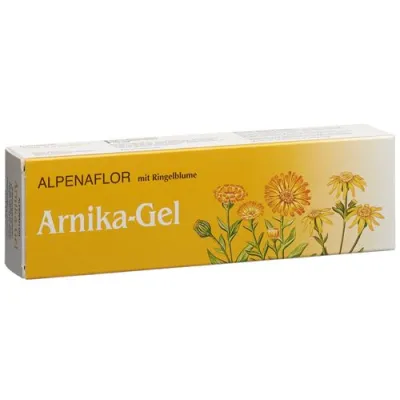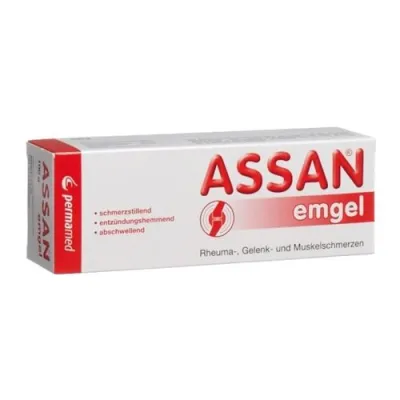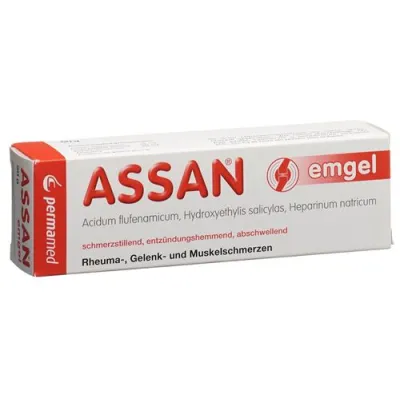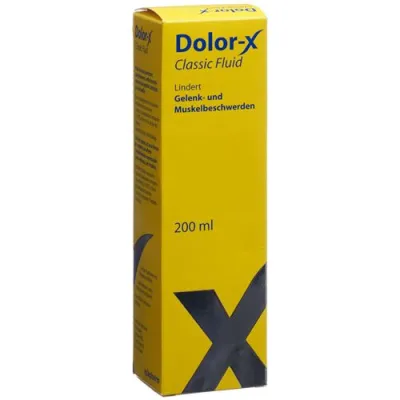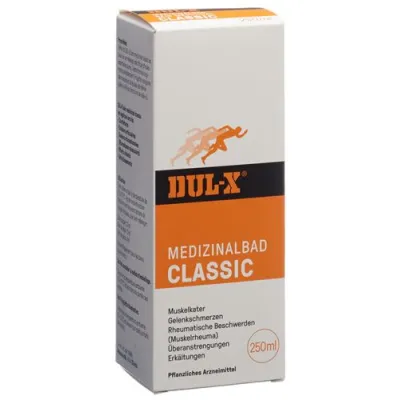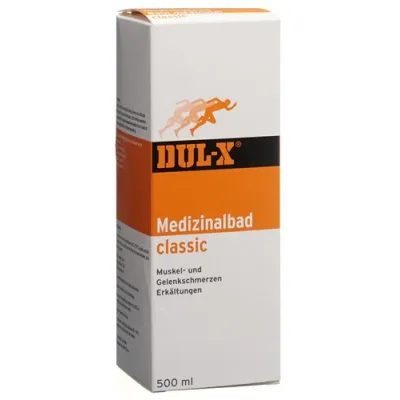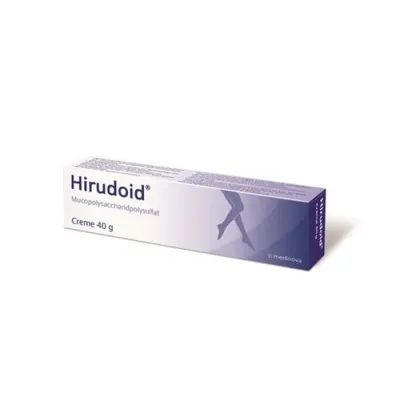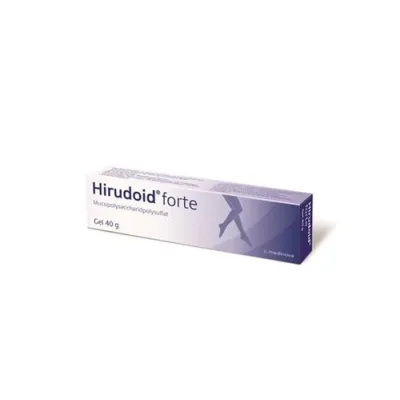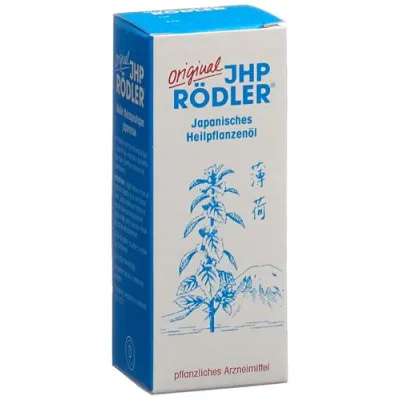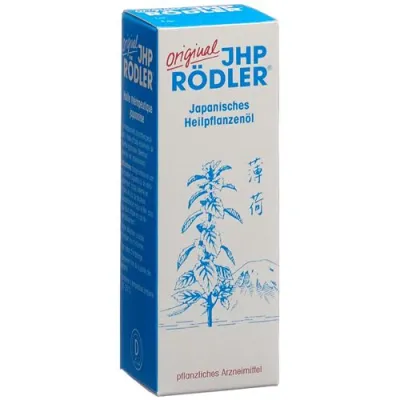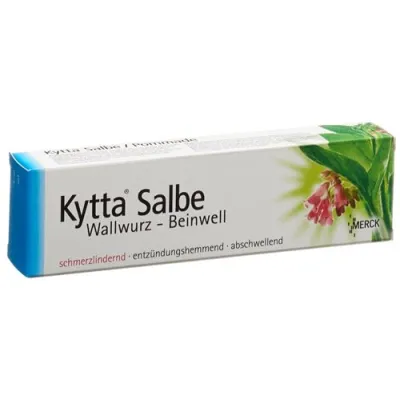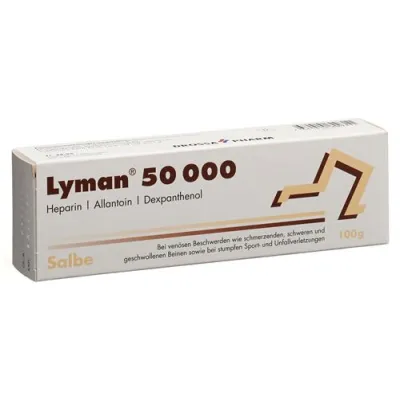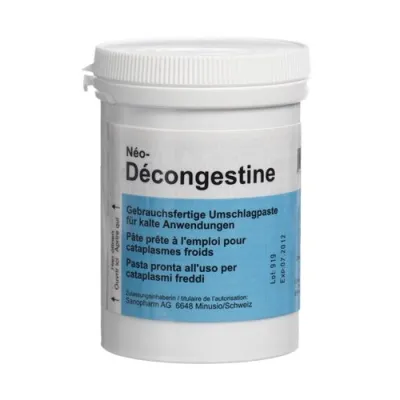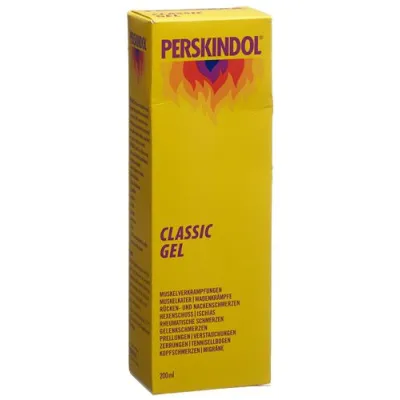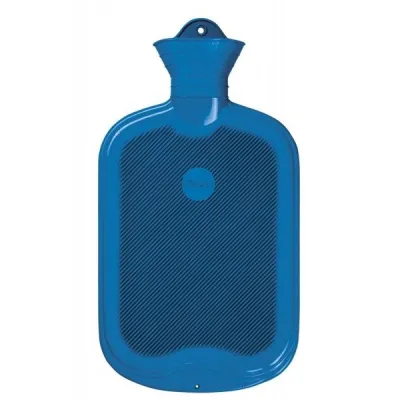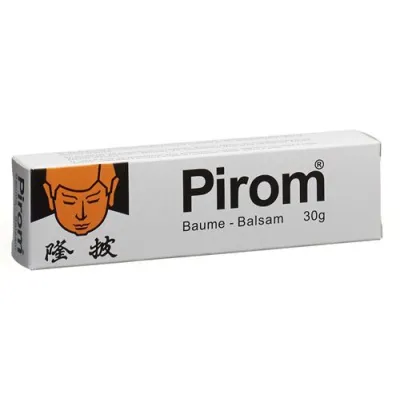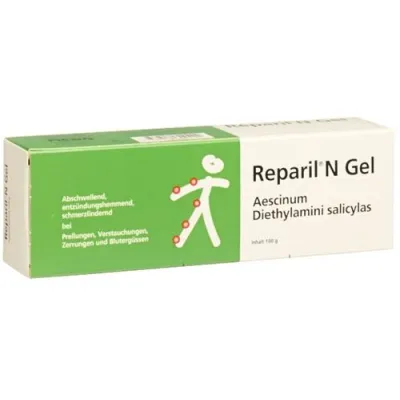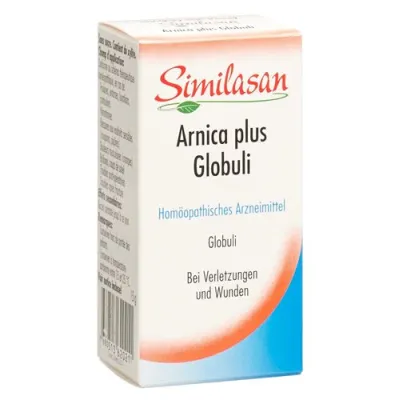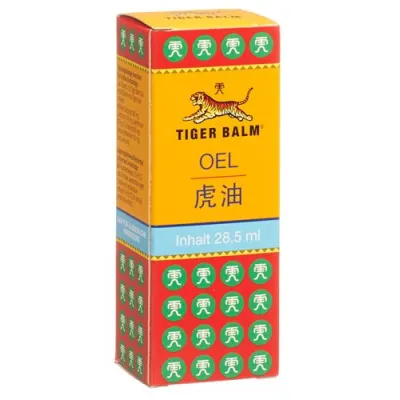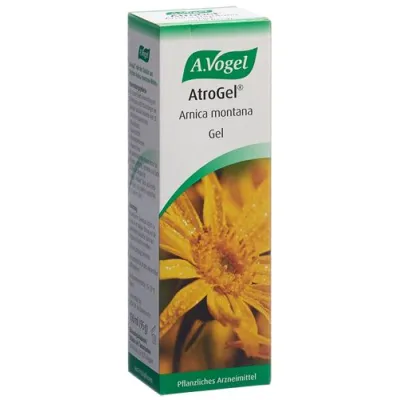Muscle pain relief
(2 Pages)
Alpenaflor arnica gel tube 110 g
Arnica and marigold are well-known and proven medicinal plants for the external treatment of inflammation and dull, i. bloodless injuries. Arnica has an anti-inflammatory effect and promotes the healing process. The modern dosage form as a gel is used for sprains, strains and bruises, for the supportive treatment of varicose veins and heavy legs. Relieves insect bites. Swissmedic-approved patient information Alpenaflor Arnica Gel Tentan AG Herbal medicinal product What is Alpenaflor Arnica Gel and when is it used? Arnica and marigold are well-known and proven medicinal plants for the external treatment of inflammation and dull, i. bloodless injuries. Arnica has an anti-inflammatory effect and promotes the healing process. The modern dosage form as a gel is used for sprains, strains and bruises, for the supportive treatment of varicose veins and heavy legs. Relieves insect bites. What should be considered? If you suffer from vein problems, you should ensure sufficient exercise (swimming, hiking), elevate your legs at night and avoid standing for long periods Or at least bandage your legs. When must Alpenaflor Arnica Gel not be used or only with caution? Alpenaflor Arnica Gel must not be used if there is a known hypersensitivity to one of the ingredients (e.g. arnica Allergy). Do not use on open wounds, eczema, mucous membranes. Do not use on small children. Use carefully if you are prone to allergies. Avoid contact with eyes. Tell your doctor, pharmacist or druggist if you suffer from other diseaseshave allergies ortake other medicines (including those you bought yourself!) or use them externally. div> Can Alpenaflor Arnica Gel be used during pregnancy or while breastfeeding? Based on previous experience, there is no known risk for the child if used as directed. However, systematic scientific investigations have never been carried out. As a precaution, you should avoid taking medicines during pregnancy and breastfeeding or ask your doctor, pharmacist or druggist for advice. How do you use Alpenaflor Arnica Gel?Adults: If necessary, apply thinly to the body parts to be treated several times a day Apply and just lightly massage in. Wash hands after use. The use and safety of Alpenaflor Arnica Gel in children and adolescents has not yet been tested. Stick to the dosage given in the package leaflet or as prescribed by your doctor. If you think the medicine is too weak or too strong, talk to your doctor, pharmacist or druggist. What side effects can Alpenaflor Arnica Gel have? The following side effects can occur when using Alpenaflor Arnica Gel: If painful, itchy and inflammatory skin changes occur, the Discontinue treatment and consult a doctor if necessary. If you notice side effects that are not described here, you should inform your doctor, pharmacist or druggist. What else needs to be considered? Keep out of the reach of children. Do not ingest. Store at room temperature (15-25°C). The medicinal product may only be used up to the date marked «EXP» on the package. Your doctor, pharmacist or druggist can provide you with further information. What does Alpenaflor Arnica Gel contain? Composition per 1 g of gel: 150 mg ethanolic liquid extract from dried arnica flowers (DEV 1:9, extracting agent alcohol 65% v/v), 10 mg ethanolic liquid extract from dried marigold flowers (DEV 1:3, extracting agent alcohol 24% v/v). This preparation also contains auxiliary substances. Approval number 47912 (Swissmedic). Where can you get Alpenaflor Arnica Gel? What packs are available? This is an over-the-counter medicine. Tubes of 110 g Authorization holder Tentan AG, 4452 Itingen. This leaflet was last checked by the drug authority (Swissmedic) in February 2010. PI035100/03.20 ..
33.68 USD
Assan emgel 100 g
What is Assan emgel/gel and when is it used?Assan has anti-inflammatory and analgesic properties and accelerates the regression of swelling.Assan is non-greasy and non-oily. Assan gel contains alcohol and also has a soothing cooling effect.Assan is used for:Acute and chronic rheumatic complaints;painful and inflammatory diseases of the musculoskeletal system, muscles, tendons, ligaments, joints, spine or intervertebral discs;blunt injuries such as bruises, sprains, strains;venous leg problems.When should Assan emgel/gel not be used?Assan must not be used in case of hypersensitivity to any of the active ingredients or excipients or in case of hypersensitivity to other painkillers and anti-inflammatory substances.Furthermore, Assan should not be used on large areas of skin for a long period of time in patients with previously damaged kidneys.Do not get Assan in the eyes, on mucous membranes, open wounds or damaged skin.When should caution be exercised when using Assan emgel/gel?When used as directed, no special precautions are required. Assan gel contains 85 mg propylene glycol per 1 g gel. Assan gel contains 365 mg alcohol per 1 g gel. It may cause a burning sensation on damaged skin.Inform your doctor, pharmacist or druggist if you have any questions about this medicine.if you have previously experienced allergic symptoms after using similar preparations (“rheumatism ointments”),If yousuffer from other diseases,have allergies ortake other medicines (including those you have bought yourself!) or use them externally.Can Assan emgel/gel be used during pregnancy or while breastfeeding?If you are pregnant, planning to become pregnant or breastfeeding, you should only use Assan after consulting your doctor.As a precautionary measure, you should avoid taking any medicines during pregnancy and breastfeeding, or ask your doctor, pharmacist or druggist for advice.How do you use Assan emgel/gel?Adult:Unless otherwise prescribed by your doctor, apply Assan 2-3 times a day in a 5-10 cm long strip to the affected areas and the surrounding skin and rub it into the skin. The application area should be free of medicines and cosmetics. Wash your hands thoroughly after rubbing.The use and safety of Assan emgel/gel in children and adolescents has not yet been tested.Follow the dosage instructions in the package leaflet or as prescribed by your doctor. If you think the medicine is too weak or too strong, talk to your doctor, pharmacist or druggist.What side effects can Assan emgel/gel have?The following side effects may occur when using Assan:In rare cases, skin irritations such as redness may occur, which usually disappear after discontinuation of the preparation.If you notice any side effects not listed here, you should inform your doctor, pharmacist or druggist.What else should be considered?durabilityThis medicine should only be used until the date stated on the container with “EXP”.storage instructionsStore at room temperature (15-25°C).Do not ingest and keep out of reach of children.Further informationYour doctor, pharmacist or druggist can provide you with further information. These people have the detailed specialist information.What is contained in Assan emgel/gel?active ingredients1 g Assan emgel contains the active ingredients 35 mg flufenamic acid, 100 mg hydroxyethyl salicylate and 300 IU heparin sodium1 g of Assan gel contains the active ingredients 35 mg flufenamic acid, 50 mg hydroxyethyl salicylate and 300 IU heparin sodiumexcipientsAssan emgel contains as excipients carbomer 980, glyceryl stearate, PEG-100 stearate, PEG-2 stearate, paraffin oil, rosemary oil, pentadecalactone, disodium EDTA, methyl glucose sesquistearate, PEG-20 methyl glucose sesquistearate, dimethicone, isopropyl palmitate, caustic soda, purified water.Assan gel contains as excipients ethanol 96% 365 mg/g, propylene glycol (E1520) 85 mg/g, aminomethyl propanol, hydroxymethylcellulose, rosemary oil, disodium EDTA, diisopropyl adipate, polysorbate 20, diethylene glycol monoethyl ether, purified water.registration number55608, 45443 (Swissmedic).Where can you get Assan emgel/gel? What packs are available?In pharmacies and drugstores, without a doctor's prescription.Assan emgel: tubes of 50 g and 100 g.Assan gel: tubes of 50 g and 100 g.marketing authorization holderPermamed AG, CH 4143 Dornach...
55.94 USD
Assan emgel tube 50g
What is Assan Emgel/gel and when is it used?Assan Emgel has anti-inflammatory and analgesic properties and accelerates the regression of swelling.Assan Emgel does not smear or grease. Assan Emgel does not contain alcohol. Assan gel contains alcohol and also has a soothing cooling effect.Assan is used for:Acute and chronic rheumatic complaints;Painful and inflammatory diseases of the musculoskeletal and supporting apparatus, muscles, tendons, ligaments, joints, the spine or intervertebral discs;Blunt injuries such as bruises, sprains, strains;Venous leg disorders.When should Assan Emgel/gel not be used?Assan Emgel must not be used in the event of hypersensitivity to any of the active ingredients or excipients or hypersensitivity to other pain-relieving and anti-inflammatory substances.Furthermore, Assan Emgel should not be used on large areas of skin for a long time in patients with previously damaged kidneys.Do not get Assan in your eyes, on your mucous membranes, or on open wounds or damaged skin.When is caution required when using Assan Emgel/gel?When used as intended, no special precautions need to be taken. Tell your doctor, pharmacist or druggist if you have previously had allergic symptoms after using similar preparations ("rheumatism ointments"), if you suffer from other diseases, have allergies or other medicines (including self-bought) or apply externally!Can Assan Emgel/gel be used during pregnancy or while breastfeeding?If you are pregnant, want to become pregnant or are breastfeeding, you should only use Assan after consulting your doctor.As a precaution, you should avoid taking medicines during pregnancy and breastfeeding or ask your doctor, pharmacist or druggist for advice.How do you use Assan Emgel/gel?Adult:Unless otherwise prescribed by the doctor, apply Assan 2-3 times a day in a 5-10 cm long strand to the affected areas and the surrounding skin areas and rub into the skin. The place of application should be free of drugs and cosmetics. After rubbing, wash your hands thoroughly.The use and safety of Assan Emgel/gel in children and adolescents has not yet been tested.Follow the dosage given in the package leaflet or prescribed by your doctor. If you think the medicine is too weak or too strong, talk to your doctor, pharmacist or druggist.What side effects can Assan Emgel/gel have?The following side effects may occur when using Assan:In rare cases, skin irritations such as redness can occur, which usually disappear after the preparation has been discontinued.If you notice any side effects that are not described here, you should inform your doctor, pharmacist or druggist.What should also be noted?Do not ingest and keep out of the reach of children.Store Assan at room temperature (15-25°C).The medicinal product may only be used up to the date marked “EXP” on the container.Your doctor, pharmacist or druggist can provide you with further information. These people have the detailed information for specialists.What is in Assan Emgel/gel?1 g Assan emgel contains 35 mg flufenamic acid, 100 mg hydroxyethyl salicylate, 300 IU heparin sodium, aromatics and other additives as active ingredients.1 g Assan gel contains as active ingredients 35 mg flufenamic acid, 50 mg hydroxyethyl salicylate, 300 IU heparin sodium, propylene glycol, aromatics and other excipients.Registration Number55608, 45443 (Swissmedic).Where can you get Assan emgel/gel? What packs are available?In pharmacies and drugstores, without medical prescription.Assan emgel: 50 g and 100 g tubes.Assan gel: 50 g and 100 g tubes.Marketing Authorization HolderPermamed AG, 4143 Dornach...
32.33 USD
Dolor-x classic fluid 200ml
Dolor-X Classic Gel/Fluid Axapharm AGWhat is Dolor-X Classic Gel/Fluid and when is it used? Dolor-X Classic Gel/Fluid is a liquid-based or gel-based medical product for external use that stimulates blood circulation. Dolor-X Classic Gel/Fluid penetrates the skin quickly and without leaving any residue and is non-greasy; hands and clothing remain grease-free. The physical effect of the ingredients is shown in a cooling effect and subsequent stimulation of local blood circulation, which is combined with a pleasant warming effect. This relaxes the muscles and relieves pain. The essential oils, menthol and camphor, support well-being.Dolor-X Classic Gel/Fluid is suitable: Before and during exercise to improve blood circulation and relax muscles.After exercise to relax, refresh and recover muscles and joints.For rubbing on the forehead and neck to refresh headaches. When should Dolor-X Classic Gel/Fluid not be used? Do not apply near the eyes, on mucous membranes and only on healthy skin. Do not use if you are hypersensitive to other painkillers and anti-inflammatory substances (particularly salicylic acid compounds, salicin). If you are prone to hypersensitivity to one of the ingredients, you should not use Dolor-X Classic Gel/Fluid (see «What is contained in Dolor-X Classic Gel/Fluid?»). Do not use under airtight compression bandages.Dolor-X Classic Gel/Fluid must not be used on children under 4 years of age or on people with bronchial asthma.Inform your pharmacist or druggist if you suffer from illnesses, have allergies or are using or taking medicines, including those you have bought yourself. Can Dolor-X Classic Gel/Fluid be used during pregnancy or while breastfeeding? Based on experience to date, there is no known risk to the child if used as directed. As a precaution, you should avoid using it during pregnancy and breastfeeding if possible or ask your pharmacist or druggist for advice. How do you use Dolor-X Classic Gel/Fluid? If necessary, rub the desired parts of the body several times a day with a sufficient amount of Dolor-X Classic Gel or Classic Fluid. Wash your hands thoroughly after use. Follow the dosage instructions in the package leaflet or the dosage recommended by your pharmacist or druggist. What side effects can Dolor-X Classic Gel/Fluid have? The following side effects can occur when using Dolor-X Classic Gel/Fluid: Occasionally, slight itching, redness or burning of the skin can occur. In the case of rare eczematous skin changes or very rare severe hypersensitivity reactions, treatment should be discontinued and, if necessary, the doctor, pharmacist or druggist should be informed. If you notice side effects that are not described here, you should inform your pharmacist or druggist. What else should be observed? Dolor-X Classic Gel/Fluid should be stored at room temperature (15-25 °C) and out of the reach of children. Dolor-X Classic Gel/Fluid should not be ingested. Dolor-X Classic Gel/Fluid may only be used until the expiry date stated on the container. Your pharmacist or druggist can provide you with further information. What is contained in Dolor-X Classic Gel/Fluid? Gel: Isopropyl alcohol, Aqua, Menthol, Abies sibirica needle oil, Hydroxypropylcellulose, Carbomer, Parfum (Gaultheria procumbens), Tromethamine, Vanillyl butyl ether, Allylanisole, Limonene, Linalool, CI19140 (Yellow No.5).Fluid: Isopropyl alcohol, Aqua, Menthol, Hydroxypropylcellulose, Parfum (Gaultheria procumbens), Vanillyl butyl ether, Camphor, Limonene, Linalool. Without artificial preservatives. Where can you get Dolor-X Classic Gel/Fluid? What packaging is available? Available in pharmacies and drugstores.Dolor-X Classic Gel: Airless dispenser of 100 ml and 200 ml.Dolor-X Classic Fluid: Bottle of 200 ml. Manufacturer Axapharm AG, Zugerstrasse 32, CH-6340 Baar. Status of information July 2018. Published on 18.07.2018 ..
35.10 USD
Dul-x classic medicinal bath bottle 250 ml
Herbal medicineWhat is DUL-X medicinal bath classic and when is it used?DUL-X medicinal bath classic contains essential oils from plants as active ingredients. It is used to relax and relieve pain when the musculoskeletal system (muscles, joints) is overexerted.By increasing the blood circulation in the skin, the skin functions are revitalized.DUL-X medicinal bath classic is used for:Sore muscles, joint pain, rheumatic complaints (muscular rheumatism), overexertion,colds.When should DUL-X Medicinal Bath classic not be used?DUL-X medicinal bath classic must not be used for:known hypersensitivity to one of the ingredients (see composition),small children.When should you be careful when using DUL-X Medicinal Bath classic?Avoid eye contact.In the case of major skin injuries, skin diseases, feverish illnesses, heart and circulatory weakness and high blood pressure, full baths should only be used after consulting a doctor, regardless of the ingredients.DUL-X medicinal bath classic contains soybean oil. It must not be used if you are hypersensitive (allergic) to peanut or soy.Tell your doctor, pharmacist or druggist if yousuffer from other illnesses,Have allergies orTake other medicines (including those you bought yourself!) or use externally!Can DUL-X Medicinal Bath Classic be used during pregnancy or while breastfeeding?Based on previous experience, there is no known risk to the child when used as directed. However, systematic scientific studies were never carried out. As a precaution, you should avoid taking medicines if possible during pregnancy and breastfeeding or ask your doctor, pharmacist or druggist for advice.How do you use DUL-X medicinal bath classic?First fill in the bath water and set it to a temperature of 37-37.5 °C. Then add DUL-X Medicinal Bath classic according to the dosage instructions below and stir well:for a full bath: approx. 20 ml,for a sitz bath: approx. 10 ml,for a foot bath: approx. 8 ml.DUL-X medicinal bath classic is also suitable for use in bubble baths.Stick to the dosage stated in the package leaflet or prescribed by your doctor. If you think the medicine is too weak or too strong, talk to your doctor, pharmacist or druggist.What side effects can DUL-X medicinal bath classic have?The following side effects can occur when using DUL-X Medicinal Bath classic:Skin irritation.In this case, further use should be avoided and your doctor should be consulted if necessary.If you notice any side effects, contact your doctor, pharmacist or druggist. This applies in particular to side effects that are not stated in this leaflet.What should also be noted?DUL-X Medicinal Bath classic may only be used until the date marked “EXP” on the container.Storage instructionsThe medicine should be kept out of the reach of children and should be kept at room temperature (15-25°C).More informationYour doctor, pharmacist or druggist can provide you with further information.What is included in DUL-X medicinal bath classic?100 g DUL-X medicinal bath classic contains:Active ingredientsCamphor 1.5 g, eucalyptus oil 3.0 g, wintergreen oil 2.0 g, peppermint oil 2.2 g and rosemary oil 4.0 g.ExcipientsSoybean oil, ethoxylated lauryl/myristyl alcohol (polyethylene glycol ether), corn seed oil, diethanolamide (cocoamide-diethanolamine), star anise oil, citronella oil, cajeput oil, thyme oil, copper chlorophyllin (E 141).Approval number33186 (Swissmedic).Where can you get DUL-X medical bath classic? Which packs are available?In pharmacies and drugstores, without medical prescription.Pack of 250 ml and 500 ml bottles.Authorization holderMelisana AG, 8004 Zurich...
62.47 USD
Dul-x classic medicinal bath bottle 500 ml
Herbal medicineWhat is DUL-X medicinal bath classic and when is it used?DUL-X medicinal bath classic contains essential oils from plants as active ingredients. It is used to relax and relieve pain when the musculoskeletal system (muscles, joints) is overexerted.By increasing the blood circulation in the skin, the skin functions are revitalized.DUL-X medicinal bath classic is used for:Sore muscles, joint pain, rheumatic complaints (muscular rheumatism), overexertion,colds.When should DUL-X Medicinal Bath classic not be used?DUL-X medicinal bath classic must not be used for:known hypersensitivity to one of the ingredients (see composition),small children.When should you be careful when using DUL-X Medicinal Bath classic?Avoid eye contact.In the case of major skin injuries, skin diseases, feverish illnesses, heart and circulatory weakness and high blood pressure, full baths should only be used after consulting a doctor, regardless of the ingredients.DUL-X medicinal bath classic contains soybean oil. It must not be used if you are hypersensitive (allergic) to peanut or soy.Tell your doctor, pharmacist or druggist if yousuffer from other illnesses,Have allergies orTake other medicines (including those you bought yourself!) or use externally!Can DUL-X Medicinal Bath Classic be used during pregnancy or while breastfeeding?Based on previous experience, there is no known risk to the child when used as directed. However, systematic scientific studies were never carried out. As a precaution, you should avoid taking medicines if possible during pregnancy and breastfeeding or ask your doctor, pharmacist or druggist for advice.How do you use DUL-X medicinal bath classic?First fill in the bath water and set it to a temperature of 37-37.5 °C. Then add DUL-X Medicinal Bath classic according to the dosage instructions below and stir well:for a full bath: approx. 20 ml,for a sitz bath: approx. 10 ml,for a foot bath: approx. 8 ml.DUL-X medicinal bath classic is also suitable for use in bubble baths.Stick to the dosage stated in the package leaflet or prescribed by your doctor. If you think the medicine is too weak or too strong, talk to your doctor, pharmacist or druggist.What side effects can DUL-X medicinal bath classic have?The following side effects can occur when using DUL-X Medicinal Bath classic:Skin irritation.In this case, further use should be avoided and your doctor should be consulted if necessary.If you notice any side effects, contact your doctor, pharmacist or druggist. This applies in particular to side effects that are not stated in this leaflet.What should also be noted?DUL-X Medicinal Bath classic may only be used until the date marked “EXP” on the container.Storage instructionsThe medicine should be kept out of the reach of children and should be kept at room temperature (15-25°C).More informationYour doctor, pharmacist or druggist can provide you with further information.What is included in DUL-X medicinal bath classic?100 g DUL-X medicinal bath classic contains:Active ingredientsCamphor 1.5 g, eucalyptus oil 3.0 g, wintergreen oil 2.0 g, peppermint oil 2.2 g and rosemary oil 4.0 g.ExcipientsSoybean oil, ethoxylated lauryl/myristyl alcohol (polyethylene glycol ether), corn seed oil, diethanolamide (cocoamide-diethanolamine), star anise oil, citronella oil, cajeput oil, thyme oil, copper chlorophyllin (E 141).Approval number33186 (Swissmedic).Where can you get DUL-X medical bath classic? Which packs are available?In pharmacies and drugstores, without medical prescription.Pack of 250 ml and 500 ml bottles.Authorization holderMelisana AG, 8004 Zurich...
105.60 USD
Flector ep tissugel pfl 2 pcs
Flector EP Tissugel is a self-adhesive, flexible patch to be placed on the skin, containing the active ingredient diclofenac, a substance with analgesic and anti-inflammatory properties. Flector EP Tissugel is indicated for the local and symptomatic treatment of osteoarthritis of the knee (gonarthrosis). Flector EP Tissugel is used for the local treatment of pain, inflammation and swelling as a result of sprains, dislocations, bruises and strains. Swissmedic-approved patient informationFlector EP Tissugel®IBSA Institut Biochimique SAWhat is Flector EP Tissugel and when is it used? Flector EP Tissugel is a self-adhesive, flexible patch to be placed on the skin, containing the active ingredient diclofenac, a substance with analgesic and anti-inflammatory properties. Flector EP Tissugel is indicated for the local and symptomatic treatment of osteoarthritis of the knee (gonarthrosis). Flector EP Tissugel is used for the local treatment of pain, inflammation and swelling as a result of sprains, dislocations, bruises and strains. When not to use Flector EP Tissugel?Do not use Flector EP Tissugel:If you are hypersensitive to the active substance or to an excipient according to the composition (see «What does Flector EP Tissugel contain?»), If you are hypersensitive to other painkillers and anti-inflammatory drugs (e.g. acetylsalicylic acid). Flector EP Tissugel must not be used on open wounds (e.g. skin abrasions, cuts, etc.) or on eczematous skin. When is caution required when using Flector EP Tissugel?Flector EP Tissugel must not come into contact with the eyes and mucous membranes. Tell your doctor, pharmacist or druggist if you: have already used similar products (rheumatism ointments) and these have led to allergic reactions, Suffer from other illnesses, have allergies or take other medicines (including those you bought yourself!) or use them externally. Can Flector EP Tissugel be used while pregnant or breastfeeding?As a precautionary measure, you should not use Flector EP Tissugel while pregnant or breastfeeding, unless expressly stated medical prescription. How do you use Flector EP Tissugel?Twice a day, morning and evening, 1 self-adhesive plaster is applied to the skin area to be treated. Before use, remove the clear film that protects the gelatinous surface. Instructions for use: see image on the bag. If the patch does not adhere well, as may be the case on the elbow, knee or ankle, use the elastic mesh stocking included in the pack for additional fixation. The duration of treatment should not exceed 14 days. The use of Flector EP Tissugel in children has not been systematically evaluated. Stick to the dosage given in the package leaflet or as prescribed by your doctor. If you think the medicine is too weak or too strong, talk to your doctor, pharmacist or druggist. What side effects can Flector EP Tissugel have?Flector EP Tissugel is generally well tolerated. The following side effects may occur when using Flector EP Tissugel: Itching, redness, swelling or blistering at the treated area. Very rarely, severe skin rashes, allergic reactions such as wheezing, shortness of breath or facial swelling, or increased sensitivity to sunlight have been observed. If any of the following side effects occur, stop using Flector EP Tissugel and tell your doctor immediately: severe skin rash, wheezing, shortness of breath or swelling of the face. If you notice side effects that are not described here, you should inform your doctor, pharmacist or druggist. What else needs to be considered?The medicine should be stored at room temperature (15-25 °C) and out of the reach of children. The medicinal product may only be used up to the date marked «EXP» on the container. Once the envelope is first opened, the patches should be used within 3 months. After cutting, the packaging can be resealed at any time so that the patches retain their moisture. Your doctor, pharmacist or druggist can provide you with further information. These people have the detailed information for specialists. What does Flector EP Tissugel contain?Active ingredients: Diclofenac Epolamine, 182 mg per patch (corresponding to a concentration of 1.3% diclofenac epolamine, or 1% diclofenac sodium salt). Excipients: propylene glycol, preservative: propyl parahydroxybenzoate (E216), methyl parahydroxybenzoate (E218), flavorings. Approval number52022 (Swissmedic). Where can you get Flector EP Tissugel? What packs are available?In pharmacies and drugstores, without a doctor's prescription. Packs of 2, 5, 10 and 15 patches. Packs of elastic fishnet stockings. Authorization holderIBSA Institut Biochimique SA, Lugano. This leaflet was last checked by the Medicines Agency (Swissmedic) in November 2016. ..
26.95 USD
Flector ep tissugel pfl 5 pcs
Flector EP Tissugel is a self-adhesive, flexible patch to be placed on the skin, containing the active ingredient diclofenac, a substance with analgesic and anti-inflammatory properties. Flector EP Tissugel is indicated for the local and symptomatic treatment of osteoarthritis of the knee (gonarthrosis). Flector EP Tissugel is used for the local treatment of pain, inflammation and swelling as a result of sprains, dislocations, bruises and strains. Swissmedic-approved patient informationFlector EP Tissugel®IBSA Institut Biochimique SAWhat is Flector EP Tissugel and when is it used? Flector EP Tissugel is a self-adhesive, flexible patch to be placed on the skin, containing the active ingredient diclofenac, a substance with analgesic and anti-inflammatory properties. Flector EP Tissugel is indicated for the local and symptomatic treatment of osteoarthritis of the knee (gonarthrosis). Flector EP Tissugel is used for the local treatment of pain, inflammation and swelling as a result of sprains, dislocations, bruises and strains. When not to use Flector EP Tissugel?Do not use Flector EP Tissugel:If you are hypersensitive to the active substance or to an excipient according to the composition (see «What does Flector EP Tissugel contain?»), If you are hypersensitive to other painkillers and anti-inflammatory drugs (e.g. acetylsalicylic acid). Flector EP Tissugel must not be used on open wounds (e.g. skin abrasions, cuts, etc.) or on eczematous skin. When is caution required when using Flector EP Tissugel?Flector EP Tissugel must not come into contact with the eyes and mucous membranes. Tell your doctor, pharmacist or druggist if you: have already used similar products (rheumatism ointments) and these have led to allergic reactions, Suffer from other illnesses, have allergies or take other medicines (including those you bought yourself!) or use them externally. Can Flector EP Tissugel be used while pregnant or breastfeeding?As a precautionary measure, you should not use Flector EP Tissugel while pregnant or breastfeeding, unless expressly stated medical prescription. How do you use Flector EP Tissugel?Twice a day, morning and evening, 1 self-adhesive plaster is applied to the skin area to be treated. Before use, remove the clear film that protects the gelatinous surface. Instructions for use: see image on the bag. If the patch does not adhere well, as may be the case on the elbow, knee or ankle, use the elastic mesh stocking included in the pack for additional fixation. The duration of treatment should not exceed 14 days. The use of Flector EP Tissugel in children has not been systematically evaluated. Stick to the dosage given in the package leaflet or as prescribed by your doctor. If you think the medicine is too weak or too strong, talk to your doctor, pharmacist or druggist. What side effects can Flector EP Tissugel have?Flector EP Tissugel is generally well tolerated. The following side effects may occur when using Flector EP Tissugel: Itching, redness, swelling or blistering at the treated area. Very rarely, severe skin rashes, allergic reactions such as wheezing, shortness of breath or facial swelling, or increased sensitivity to sunlight have been observed. If any of the following side effects occur, stop using Flector EP Tissugel and tell your doctor immediately: severe skin rash, wheezing, shortness of breath or swelling of the face. If you notice side effects that are not described here, you should inform your doctor, pharmacist or druggist. What else needs to be considered?The medicine should be stored at room temperature (15-25 °C) and out of the reach of children. The medicinal product may only be used up to the date marked «EXP» on the container. Once the envelope is first opened, the patches should be used within 3 months. After cutting, the packaging can be resealed at any time so that the patches retain their moisture. Your doctor, pharmacist or druggist can provide you with further information. These people have the detailed information for specialists. What does Flector EP Tissugel contain?Active ingredients: Diclofenac Epolamine, 182 mg per patch (corresponding to a concentration of 1.3% diclofenac epolamine, or 1% diclofenac sodium salt). Excipients: propylene glycol, preservative: propyl parahydroxybenzoate (E216), methyl parahydroxybenzoate (E218), flavorings. Approval number52022 (Swissmedic). Where can you get Flector EP Tissugel? What packs are available?In pharmacies and drugstores, without a doctor's prescription. Packs of 2, 5, 10 and 15 patches. Packs of elastic fishnet stockings. Authorization holderIBSA Institut Biochimique SA, Lugano. This leaflet was last checked by the Medicines Agency (Swissmedic) in November 2016. ..
56.62 USD
Hirudoid cream 3mg/g tube 40g
Hirudoid cream contains the active ingredient heparinoid MPS (chondroitin polysulphate). MPS is the abbreviation for mucopolysaccharide polysulfate. This active ingredient prevents the formation of blood clots and promotes their regression. In addition, inflammatory processes and fluid accumulations in the tissue are eliminated. After using Hirudoid Cream, tissue tension and the associated pain are reduced, swelling and bruising are reduced, and the heaviness in the legs is relieved. Hirudoid cream is applied: for complaints associated with varicose veins such as pain, feelings of heaviness, swollen legs (stasis oedema) to loosen up hard scars, for scar care and cosmetic improvement of the scars for dull scars Sports injuries and accidents such as bruises, contusions, strains, with bruising and swelling for muscle and tendon pain Hirudoid cream can also be used with a doctor's prescription for (superficial) phlebitis; for inflammatory conditions in varicose veins, for follow-up treatment of sclerotherapy; for supportive treatment of venous thrombosis are applied. Swissmedic-approved patient informationHirudoid® CremeMedinova AGWhat is Hirudoid Creme and when is it used?Hirudoid Cream contains the active ingredient heparinoid MPS (chondroitin polysulphate). MPS is the abbreviation for mucopolysaccharide polysulfate. This active ingredient prevents the formation of blood clots and promotes their regression. In addition, inflammatory processes and fluid accumulations in the tissue are eliminated. After using Hirudoid Cream, tissue tension and the associated pain are reduced, swelling and bruising are reduced, and the heaviness in the legs is relieved. Hirudoid cream is applied:for complaints associated with varicose veins such as pain, feelings of heaviness, swollen legs (stasis oedema)to loosen up hard scars, for scar care and cosmetic improvement of the scarsfor dull scars Sports injuries and accidents such as bruises, contusions, strains, with bruising and swellingfor pain in the muscles and tendonsHirudoid cream can also be used with a doctor's prescription for (superficial) phlebitis;for inflammatory conditions in varicose veins,for follow-up treatment of sclerotherapy;for supportive treatment of venous thrombosisare applied. What should be considered?You can support the treatment of your vein disease by making sure you get enough exercise. Sitting or standing for long periods of time causes congestion and strains your veins. Also avoid additional stress such as alcohol and cigarettes in excess, heavy or flatulent food, obesity and overheating from sunbathing and excessive use of the sauna. Also follow your doctor's advice beyond using Hirudoid, such as exercising or wearing support stockings. When should Hirudoid Creme not be used?Hirudoid Creme should not be used in patients with a known hypersensitivity to heparinoid or any of the other excipients. When is caution required when using Hirudoid Creme?Hirudoid Creme may only be used on intact skin. Please ensure that the cream does not come into contact with open wounds, eyes or mucous membranes. In the case of venous diseases that can be traced back to the presence of a blood clot (so-called thromboembolism), massage is not allowed. This medicinal product contains wool wax alcohol which may cause localized skin irritation (e.g. contact dermatitis). This medicinal product contains cetostearyl alcohol which may cause localized skin irritation (e.g. contact dermatitis). This medicinal product contains methyl parahydroxybenzoate (E218) and propyl parahydroxybenzoate (E216), these excipients can cause allergic reactions, including delayed reactions. If your symptoms persist or if the symptoms worsen, you should definitely see a doctor. Inform your doctor, pharmacist or druggist if you suffer from other illnesses, have allergies or are taking other medicines (even those you bought yourself!) or using them externally. Can Hirudoid Cream be used during pregnancy or breastfeeding?Based on previous experience, there is no known risk to the unborn child if used as directed. However, systematic scientific investigations have never been carried out. As a precaution, you should avoid taking medicines during pregnancy and breastfeeding or ask your doctor, pharmacist or druggist for advice. How do you use Hirudoid Cream?AdultsUnless otherwise prescribed by the doctor, several times a day Apply a strand of cream of 3-5 cm (more if necessary) and gently massage in until the cream disappears. In the case of thromboembolic diseases (blood clots), however, massage should not be used. With the 100 g tube, only about a third of the specified length of the cream strand (d. 1-2 cm) is to be used due to the larger tube opening. In the case of particularly painful inflammation and thrombosis, the affected area and its surroundings should be carefully coated with cream and covered with bandages. In these cases, the effect of Hirudoid Cream can be intensified by additional rubbing into the area surrounding the diseased tissue area. To loosen up hard scars, we recommend massaging in the cream vigorously. ChildrenThe use and safety of Hirudoid cream in children has not been systematically tested. Stick to the dosage given in the package leaflet or as prescribed by your doctor. If you think the medicine is too weak or too strong, talk to your doctor, pharmacist or druggist. What side effects can Hirudoid Cream have?The following side effects can occur when using Hirudoid Cream: Rare (affects 1 to 10 users in 10,000)In rare cases, skin hypersensitivity reactions (allergy) may occur. Tell your doctor or nurse if you notice any of these signs. If the irritation is severe, you should no longer use Hirudoid Cream. If you notice side effects that are not described here, you should inform your doctor, pharmacist or druggist. What else needs to be considered?The medicinal product may only be used up to the date marked «EXP» on the packaging. Storage instructionsStore at room temperature (15 - 25 °C). Store medicines in a dry place and out of the reach of children. Further informationThe aluminum foil at the opening of the tube can be easily pierced with the spike embedded in the cap. Your doctor, pharmacist or druggist can provide you with further information. These people have the detailed information for specialists. What does Hirudoid cream contain?1 g of cream contains: Active ingredientsHeparinoid MPS (chondroitin polysulphate, produced from bovine trachea) 3 mg (equivalent to 250 U.). ExcipientsGlycerol 85%, stearic acid, wool wax alcohols, cetostearyl alcohol, white vaseline, myristyl alcohol, isopropyl alcohol, potassium hydroxide, methyl 4-hydroxybenzoate (E218), thymol, propyl 4-hydroxybenzoate (E216), purified water. Approval number16105 (Swissmedic) Where can you get Hirudoid Cream? What packs are available? Hirudoid cream is available in pharmacies and drugstores without a doctor's prescription. There are packs of 40 g and 100 g cream. Authorization holderMedinova AG, 8050 Zurich This leaflet was last checked by the Medicines Agency (Swissmedic) in November 2021. ..
22.75 USD
Hirudoid forte gel 4.45mg/g tube 40g
Hirudoid forte gel contains the active ingredient heparinoid MPS (chondroitin polysulphate). MPS is the abbreviation for mucopolysaccharide polysulfate. This active ingredient prevents the formation of blood clots and promotes their regression. In addition, inflammatory processes and fluid accumulations in the tissue are eliminated. After using Hirudoid forte Gel, tissue tension and the associated pain are reduced, swelling and bruising are reduced, and the heaviness in the legs is relieved. Hirudoid forte gel is applied: for complaints associated with varicose veins such as pain, feelings of heaviness, swollen legs (stasis oedema) for blunt sports injuries and accidental injuries such as bruises, contusions, strains, bruising and swelling for muscle and tendon pain The gel has a cooling effect. With a doctor's prescription, Hirudoid forte Gel can also for (superficial) phlebitis; for inflammatory conditions in varicose veins, for follow-up treatment of sclerotherapy; for supportive treatment of venous thrombosis are applied. Swissmedic-approved patient informationHirudoid® forte GelMedinova AGWhat is Hirudoid forte Gel and when is it used?Hirudoid forte gel contains the active ingredient heparinoid MPS (chondroitin polysulphate). MPS is the abbreviation for mucopolysaccharide polysulfate. This active ingredient prevents the formation of blood clots and promotes their regression. In addition, inflammatory processes and fluid accumulations in the tissue are eliminated. After using Hirudoid forte Gel, tissue tension and the associated pain are reduced, swelling and bruising are reduced, and the heaviness in the legs is relieved. Hirudoid forte gel is applied: for complaints associated with varicose veins such as pain, feelings of heaviness, swollen legs (stasis oedema)for blunt sports injuries and accidental injuries such as bruises, contusions, strains, bruising and swelling for muscle and tendon painThe gel has a cooling effect. With a doctor's prescription, Hirudoid forte Gel can also for (superficial) phlebitis;for inflammatory conditions in varicose veins,for follow-up treatment of sclerotherapy;for supportive treatment of venous thrombosisare applied. What should be considered?You can support the treatment of your vein disease by making sure you get enough exercise. Sitting or standing for long periods of time causes congestion and strains your veins. Also avoid additional stress such as alcohol and cigarettes in excess, heavy or flatulent food, obesity and overheating from sunbathing and excessive use of the sauna. Also follow your doctor's advice beyond using Hirudoid, such as exercising or wearing support stockings. When must Hirudoid forte Gel not be used?Hirudoid forte Gel should not be used in patients with a known hypersensitivity to heparinoid or any of the other excipients. When is caution required when using Hirudoid forte Gel?Hirudoid forte Gel may only be used on intact skin. Please make sure that the gel does not come into contact with open wounds, eyes or mucous membranes. This medicine contains 5mg propylene glycol per 1g gel. Propylene glycol may cause skin irritation. In the case of venous diseases that can be traced back to the presence of a blood clot (so-called thromboembolism), massage is not allowed. If your symptoms persist or if the symptoms worsen, you should definitely see a doctor. Inform your doctor, pharmacist or druggist if you suffer from other illnesses, have allergies or are taking other medicines (even those you bought yourself!) or using them externally. Can Hirudoid forte Gel be used during pregnancy or breastfeeding?Based on previous experience, there is no known risk to the unborn child if used as directed. However, systematic scientific investigations have never been carried out. As a precaution, you should avoid taking medicines during pregnancy and breastfeeding or ask your doctor, pharmacist or druggist for advice. How do you use Hirudoid forte Gel?AdultsUnless otherwise prescribed by the doctor, several times Apply a strand of gel of 3-5 cm (more if necessary) daily. In the case of thromboembolic diseases (blood clots), however, massage should not be used. With the 100 g tube, only about a third of the specified length of the gel strand (d. 1-2 cm) is to be used due to the larger tube opening. As with all gels containing alcohol, you should not put a bandage over Hirudoid forte Gel. Hirudoid forte cream is available for use under bandages. ChildrenThe use and safety of Hirudoid forte Gel in children has not yet been systematically tested. Stick to the dosage given in the package leaflet or as prescribed by your doctor. If you think the medicine is too weak or too strong, talk to your doctor, pharmacist or druggist. What side effects can Hirudoid forte Gel have?The following side effects can occur when using Hirudoid forte Gel: Rare (affects 1 to 10 users in 10,000)In rare cases, skin hypersensitivity reactions (allergy) may occur. Tell your doctor or nurse if you notice any of these signs. If the irritation is severe, you should no longer use Hirudoid forte Gel. If you notice side effects that are not described here, you should inform your doctor, pharmacist or druggist. What else needs to be considered?The medicinal product may only be used up to the date marked «EXP» on the packaging. Storage instructionsStore at room temperature (15 - 25 °C). Store medicines in a dry place and out of the reach of children. Further informationThe aluminum foil at the opening of the tube can be easily pierced with the spike embedded in the cap. Your doctor, pharmacist or druggist can provide you with further information. These people have the detailed information for specialists. What does Hirudoid forte Gel contain?1 g of gelcontains: Active ingredientsHeparinoid MPS (chondroitin polysulphate, produced from bovine trachea) 4.45 mg (equivalent to 400 U.). ExcipientsIsopropyl alcohol, polyacrylic acid, propylene glycol (E1520), sodium hydroxide, purified water. Approval number40550 (Swissmedic) Where can you get Hirudoid forte Gel? What packs are available? Hirudoid forte Gel is available in pharmacies and drugstores without a doctor's prescription. There are packs of 40 g and 100 g gel. Authorization holderMedinova AG, 8050 Zurich This leaflet was last checked by the Medicines Agency (Swissmedic) in November 2021. ..
59.96 USD
Jhp rödler oil 10 ml
The Japanese medicinal plant oil JHP Rödler contains the essential oil of Japanese mint as an active ingredient. The essential oil of Japanese mint has an antispasmodic and decongestant effect on the mucous membranes and relieves pain. Accordingly, the Japanese medicinal plant oil JHP Rödler is used internally for stomach complaints such as flatulence, a feeling of pressure and fullness, as well as for colds with a cold, cough and hoarseness. It is also used externally for rubbing in for muscle pain, for relieving headaches and for inhalation for colds. Swissmedic-approved patient informationJHP Rödler® Japanese medicinal plant oil, liquid VERFORA SA Herbal medicinal product What is Japanese medicinal plant oil JHP Rödler and when is it used?Japanese medicinal plant oil JHP Rödler contains the essential oil of Japanese mint as an active ingredient. The essential oil of Japanese mint has an antispasmodic and decongestant effect on the mucous membranes and relieves pain. Accordingly, the Japanese medicinal plant oil JHP Rödler is used internally for stomach complaints such as flatulence, a feeling of pressure and fullness, as well as for colds with a cold, cough and hoarseness. It is also used externally for rubbing in for muscle pain, for relieving headaches and for inhalation for colds. What should be considered?Indigestion in children under the age of 12 must be examined by a doctor. Therefore, the preparation should not be used in these cases without medical advice. When must Japanese medicinal plant oil JHP Rödler not be used or only with caution?Japanese medicinal plant oil JHP Rödler must not be used - for hypersensitivity to mint oil - in infants and young children– Internally for severe digestive disorders– JHP Rödler may only be used briefly and not over a large area in patients with previously damaged kidneys becomeIn the case of external use of Japanese medicinal plant oil JHP Rödler, eye contact should be avoided. Do not use on open wounds and eczematous skin. Tell your doctor, pharmacist or druggist if you – suffer from other diseases– have allergies or – take other medicines (including those you bought yourself!) or use them externally. Can JHP Rödler Japanese medicinal plant oil be used during pregnancy or while breastfeeding?Based on previous experience, there is no known risk for the child if used as intended. However, systematic scientific investigations have never been carried out. As a precaution, you should avoid taking medicines during pregnancy and breastfeeding or ask your doctor, pharmacist or druggist for advice. How do you use Japanese medicinal plant oil JHP Rödler?Adults and children over 6 years: Oral use In case of stomach problems or colds, take 2-3 drops with a glass of water or tea up to five times a day. For inhalation For colds, add 2-3 drops of Japanese medicinal plant oil JHP Rödler to hot water several times a day and inhale the vapours. For rubbing in For headaches, gently massage 2-3 drops into the forehead, temples and neck. For muscle pain rub the painful areas several times a day with Japanese medicinal plant oil JHP Rödler. Follow the dosage given in the package leaflet or as prescribed by your doctor. If you think the medicine is too weak or too strong, talk to your doctor, pharmacist or druggist. Wash hands well after use. What side effects can Japanese medicinal plant oil JHP Rödler have?No side effects have been observed for Japanese medicinal plant oil JHP Rödler when used as intended. If you nevertheless observe side effects, inform your doctor, pharmacist or druggist. What else needs to be considered?Keep Japanese medicinal plant oil JHP Rödler out of the reach of children! Store at room temperature (15-25°C). The medicinal product may only be used up to the date marked “EXP” on the container. Your doctor, pharmacist or druggist can provide you with further information. What does JHP Rödler Japanese medicinal plant oil contain?It contains essential oil of Japanese mint (Mentha arvensis var. piperascens). The preparation also contains the dye chlorophyll-copper complex (E 141). Approval number38482 (Swissmedic) Where can you get Japanese medicinal plant oil JHP Rödler? What packs are available?In pharmacies and drugstores without a doctor's prescription. Bottles of 10 ml and 30 ml of solution are available. Authorization holderVERFORA SA, 1752 Villars-sur-Glâne. This leaflet was last checked by the drug authority (Swissmedic) in November 2009. ..
56.50 USD
Jhp rödler oil 30 ml
The Japanese medicinal plant oil JHP Rödler contains the essential oil of Japanese mint as an active ingredient. The essential oil of Japanese mint has an antispasmodic and decongestant effect on the mucous membranes and relieves pain. Accordingly, the Japanese medicinal plant oil JHP Rödler is used internally for stomach complaints such as flatulence, a feeling of pressure and fullness, as well as for colds with a cold, cough and hoarseness. It is also used externally for rubbing in for muscle pain, for relieving headaches and for inhalation for colds. Swissmedic-approved patient informationJHP Rödler® Japanese medicinal plant oil, liquid VERFORA SA Herbal medicinal product What is Japanese medicinal plant oil JHP Rödler and when is it used?Japanese medicinal plant oil JHP Rödler contains the essential oil of Japanese mint as an active ingredient. The essential oil of Japanese mint has an antispasmodic and decongestant effect on the mucous membranes and relieves pain. Accordingly, the Japanese medicinal plant oil JHP Rödler is used internally for stomach complaints such as flatulence, a feeling of pressure and fullness, as well as for colds with a cold, cough and hoarseness. It is also used externally for rubbing in for muscle pain, for relieving headaches and for inhalation for colds. What should be considered?Indigestion in children under the age of 12 must be examined by a doctor. Therefore, the preparation should not be used in these cases without medical advice. When must Japanese medicinal plant oil JHP Rödler not be used or only with caution?Japanese medicinal plant oil JHP Rödler must not be used - for hypersensitivity to mint oil - in infants and young children– Internally for severe digestive disorders– JHP Rödler may only be used briefly and not over a large area in patients with previously damaged kidneys becomeIn the case of external use of Japanese medicinal plant oil JHP Rödler, eye contact should be avoided. Do not use on open wounds and eczematous skin. Tell your doctor, pharmacist or druggist if you – suffer from other diseases– have allergies or – take other medicines (including those you bought yourself!) or use them externally. Can JHP Rödler Japanese medicinal plant oil be used during pregnancy or while breastfeeding?Based on previous experience, there is no known risk for the child if used as intended. However, systematic scientific investigations have never been carried out. As a precaution, you should avoid taking medicines during pregnancy and breastfeeding or ask your doctor, pharmacist or druggist for advice. How do you use Japanese medicinal plant oil JHP Rödler?Adults and children over 6 years: Oral use In case of stomach problems or colds, take 2-3 drops with a glass of water or tea up to five times a day. For inhalation For colds, add 2-3 drops of Japanese medicinal plant oil JHP Rödler to hot water several times a day and inhale the vapours. For rubbing in For headaches, gently massage 2-3 drops into the forehead, temples and neck. For muscle pain rub the painful areas several times a day with Japanese medicinal plant oil JHP Rödler. Follow the dosage given in the package leaflet or as prescribed by your doctor. If you think the medicine is too weak or too strong, talk to your doctor, pharmacist or druggist. Wash hands well after use. What side effects can Japanese medicinal plant oil JHP Rödler have?No side effects have been observed for Japanese medicinal plant oil JHP Rödler when used as intended. If you nevertheless observe side effects, inform your doctor, pharmacist or druggist. What else needs to be considered?Keep Japanese medicinal plant oil JHP Rödler out of the reach of children! Store at room temperature (15-25°C). The medicinal product may only be used up to the date marked “EXP” on the container. Your doctor, pharmacist or druggist can provide you with further information. What does JHP Rödler Japanese medicinal plant oil contain?It contains essential oil of Japanese mint (Mentha arvensis var. piperascens). The preparation also contains the dye chlorophyll-copper complex (E 141). Approval number38482 (Swissmedic) Where can you get Japanese medicinal plant oil JHP Rödler? What packs are available?In pharmacies and drugstores without a doctor's prescription. Bottles of 10 ml and 30 ml of solution are available. Authorization holderVERFORA SA, 1752 Villars-sur-Glâne. This leaflet was last checked by the drug authority (Swissmedic) in November 2009. ..
107.08 USD
Kytta ointment 50 g
Herbal medicineWhat is Kytta ointment and when is it used?Kytta ointment contains an extract made from the fresh roots of Symphytum officinale (common comfrey) using a special process. Kytta ointment has a decongestant, pain-relieving and anti-inflammatory effect. Kytta ointment is non-greasy and non-lubricating and is therefore easy to wash off. Kytta ointment is used externally to support the treatment of degenerative-rheumatoid diseases (e.g. knee arthritis), muscle, joint and nerve pain, and blunt, bloodless injuries such as bruises, strains and sprains. It is also used for tendonitis and, if the doctor recommends it, for the aftercare of bone fractures and dislocations.When should Kytta ointment not be used or should it only be used with caution?Kytta ointment must not be used in case of known hypersensitivity to any of the ingredients (see composition) or in children under 3 years of age.Do not use if you are prone to allergies. Kytta ointment must not be used on open wounds or mucous membranes. The eye, nose and mouth areas should be excluded from treatment with Kytta ointment.Inform your doctor, pharmacist or druggist if you suffer from other illnesses, have allergies or are taking or using other medicines externally (including those you have bought yourself)!Can Kytta ointment be used during pregnancy or while breastfeeding?Based on experience to date, there is no known risk to the child when used as directed. However, systematic scientific studies have never been carried out. As a precaution, you should avoid taking medicines during pregnancy and breastfeeding, or ask your doctor, pharmacist or druggist for advice.How do you use Kytta ointment?Unless otherwise prescribed by the doctor, apply Kytta ointment thinly up to 5 times a day and massage in carefully. (In severe cases, apply an ointment dressing.) In children between 3 and 12 years of age, the treatment period should not exceed one week.Follow the dosage instructions in the package leaflet or as prescribed by your doctor. If you think the medicine is too weak or too strong, talk to your doctor, pharmacist or druggist.What side effects can Kytta ointment have?Rarely, allergic local skin reactions (itching of the skin, reddening of the skin, contact dermatitis, eczema, burning of the skin). Very rarely, systemic hypersensitivity reactions, e.g. generalized skin reactions.In such cases, treatment should be stopped and a doctor should be consulted.If you notice any side effects not listed here, you should inform your doctor or pharmacist.What should also be noted?This medicine should only be used until the date stated on the container with “EXP”.Keep Kytta ointment out of the reach of children. Store at room temperature (15–25 °C). Shelf life after opening: 12 months.Your doctor, pharmacist or druggist will be able to provide you with further information.What is contained in Kytta ointment?1 g of ointment contains: 350 mg liquid comfrey extract from fresh roots, drug-extract ratio 1:2, extraction agent: ethanol 52% (m/m). This preparation also contains excipients and flavourings, vanillin, lauryl sulphate, the preservatives E214, E216, E218, butyl/isobutyl parahydroxybenzoate, phenoxyethanol.Registration number20713 (Swissmedic).Where can you get Kytta ointment? What packages are available?In pharmacies and drugstores, without medical prescription.Packs of 50 g, 100 g and 150 g.Marketing Authorisation HolderProcter & Gamble International Operations SA, Lancy.Domicile: 1213 Petit-LancyManufacturerP&G Health Austria GmbH & Co. OG, Spittal, Austria. ..
51.70 USD
Lyman 50000 ointment 50000 iu tube 100g
Lyman 50'000 Emgel, gel or ointment contains heparin, dexpanthenol and allantoin and is a medicine for external use. •The heparin contained in the preparation has anticoagulant, anti-inflammatory, analgesic and decongestant effects. In addition, heparin improves blood circulation when used externally. •The two components dexpanthenol and allantoin accelerate the transport of heparin through the skin. •Dexpanthenol is converted in the skin into the vitamin pantothenic acid, which ensures the normal function of the tissue. •Allantoin stimulates the metabolic processes of the layers of connective tissue beneath the skin by stimulating cell growth and the removal of metabolic products. Lyman 50'000 Emgel, gel or ointment is used: •For symptoms related to varicose veins such as pain, heaviness and swelling of the legs (stasis edema). •For blunt sports injuries and accidental injuries such as bruises, contusions, swelling, strains and bruises. •For muscle and tendon pain. •Lyman 50,000 EmGel can also be used to loosen hard scars, treat scars and improve scars cosmetically. With a doctor's prescription, Lyman 50,000 Emgel, gel or ointment can also be used for (superficial) phlebitis, for the follow-up treatment of sclerotherapy and to support venous thrombosis. Swissmedic-approved patient informationLyman® 50'000 emgel / gel / ointment Drossapharm AGWhat is Lyman 50'000 emgel, gel or Ointment and when is it used? Lyman 50'000 Emgel, gel or ointment contains heparin, dexpanthenol and allantoin and is a medicine for external use. •The heparin contained in the preparation has anticoagulant, anti-inflammatory, analgesic and decongestant effects. In addition, heparin improves blood circulation when used externally. •The two components dexpanthenol and allantoin accelerate the transport of heparin through the skin. •Dexpanthenol is converted in the skin into the vitamin pantothenic acid, which ensures the normal function of the tissue. •Allantoin stimulates the metabolic processes of the layers of connective tissue beneath the skin by stimulating cell growth and the removal of metabolic products. Lyman 50'000 Emgel, gel or ointment is used: •For symptoms related to varicose veins such as pain, heaviness and swelling of the legs (stasis edema). •For blunt sports injuries and accidental injuries such as bruises, contusions, swelling, strains and bruises. •For muscle and tendon pain. •Lyman 50,000 EmGel can also be used to loosen hard scars, treat scars and improve scars cosmetically. With a doctor's prescription, Lyman 50,000 Emgel, gel or ointment can also be used for (superficial) phlebitis, for the follow-up treatment of sclerotherapy and to support venous thrombosis. What should be considered?Follow the advice of your doctor that goes beyond the actual dosage recommendations (e.g. gymnastics or wearing support stockings). When should Lyman 50'000 Emgel, gel or ointment not be used?In the case of hypersensitivity to one of the active ingredients or one of the excipients according to the composition, Lyman 50'000 Emgel, gel or ointment are not used. Lyman 50,000 Emgel, gel or ointment must not be used in the case of heparin-induced thrombocytopenia (HIT, lack of blood platelets caused by heparin). Lyman 50'000 ointment contains peanut oil and should not be used if you are hypersensitive to peanuts or soya. When should you be careful when using Lyman 50'000 Emgel, gel or ointment?Lyman 50'000 Emgel contains 10 mg benzyl alcohol per 1 g Emgel and macrogolglycerol hydroxystearate. Benzyl alcohol can cause allergic and mild local reactions. Macrogolglycerol hydroxystearate may cause skin irritation. Lyman 50'000 Gel contains 10 mg benzyl alcohol per 1 g gel. Benzyl alcohol can cause allergic and mild local reactions. Lyman 50'000 Ointment contains peanut oil, 150 mg propylene glycol, cetostearyl alcohol, 1 mg - 5 mg sodium lauryl sulfate, methyl parahydroxybenzoate and 1.2 mg propyl parahydroxybenzoate per 1 g of ointment. The ointment contains peanut oil. It must not be used if you are hypersensitive (allergic) to peanut or soy. Propylene glycol may cause skin irritation. Cetostearyl alcohol may cause localized skin irritation (e.g. contact dermatitis). Sodium Lauryl Sulfate may cause local skin reactions (like a stinging or burning sensation) or increase skin reactions caused by other products applied to the same skin area. Methyl parahydroxybenzoate and propyl parahydroxybenzoate can cause allergic reactions, including delayed reactions. Wash your hands after applying or rubbing in Lyman 50'000 Emgel, gel or ointment. Avoid contact with eyes. Use only on intact skin, not on mucous membranes and on open wounds. In the case of venous diseases that are due to the presence of a blood clot (a so-called thrombosis), massage should not be used. If the symptoms persist or worsen, a doctor should be consulted. Due to the heparin contained in Lyman 50'000 Emgel, gel or ointment, an interaction with drugs that inhibit blood clotting (this includes drugs for blood thinning as well as many painkillers and rheumatism drugs) cannot be completely ruled out. However, a resulting increased risk of bleeding is unlikely, since heparin hardly gets into the bloodstream when Lyman 50,000 Emgel, gel or ointment is used correctly. You should ask your doctor for advice if you are using Lyman 50'000 Emgel, gel or ointment and the medicines mentioned at the same time. Tell your doctor, pharmacist or druggist if you •suffer from other diseases, •have allergies or •Take other medicines (including those you bought yourself!) or use them externally! Can Lyman 50,000 Emgel, gel or ointment be used during pregnancy or breastfeeding?Based on previous experience, there is no risk of the child known. However, systematic scientific investigations have never been carried out. As a precaution, you should avoid taking medicines during pregnancy and breastfeeding or ask your doctor, pharmacist or druggist for advice. How do you use Lyman 50'000 Emgel, gel or ointment?Adults: Unless otherwise prescribed by the doctor , Apply a strand of approx. 5 cm long to the areas of unbroken skin to be treated and to the surrounding areas of skin 2-3 times a day and rub in gently. Massage direction for the legs: from bottom to top. In the case of phlebitis, do not rub in the Emgel, gel or ointment, but apply it thickly with a knife and put on a bandage. This type of application is not suitable for children, since an increased absorption of the active ingredient through the skin cannot be ruled out, especially in small children due to the sealing effect of the bandage. The duration of use is not limited, but if the symptoms persist or worsen, the doctor should be consulted. Children and adolescents: The use and safety of Lyman 50'000 Emgel, gel or ointment in children and adolescents has not yet been tested. In children and adolescents only the gel should be used and should only be applied and not rubbed in. It should not be used on large areas. Lyman 50'000 Gel has a cooling effect and is suitable for treating large areas that are sensitive to pain. When Lyman 50,000 ointment is massaged in, a white film initially forms on the skin, which disappears as the massage continues, as the ointment penetrates completely into the skin. Stick to the dosage given in the package leaflet or as prescribed by your doctor. If you think the medicine is too weak or too strong, talk to your doctor, pharmacist or druggist. What side effects can Lyman 50'000 emgel, gel or ointment have?Rarely (affects 1 to 10 users in 10'000) An allergy can develop in hypersensitive patients. In such cases, treatment should be discontinued. If you get any side effects, talk to your doctor, pharmacist or druggist. This also applies in particular to side effects that are not listed in this leaflet. What else needs to be considered?The medicinal product may only be used up to the date marked «EXP» on the container. Keep out of the reach of children, at room temperature (15°C-25°C) and in the original packaging. Your doctor, pharmacist or druggist can provide you with further information. These people have the detailed information for specialists. What does Lyman 50'000 Emgel, gel or ointment contain?1 g of Lyman 50'000 Emgel contains: Active ingredients: 500 IU heparin, 4 mg dexpanthenol, 3 mg allantoin Excipients: octyldodecanol, isopropyl alcohol, carbomer 980, benzyl alcohol, trometamol, macrogolglycerol hydroxystearate, lavender oil, macrogollauryl ether, purified water 1 g Lyman 50'000 gel contains: Active ingredients: 500 IU heparin, 4 mg dexpanthenol, 3 mg allantoin Excipients: Carbomer 980, isopropyl alcohol, benzyl alcohol, trometamol, macrogollauryl ether, lavender oil, purified water 1 g of Lyman 50'000 ointment contains: Active ingredients: 500 IU heparin, 4 mg dexpanthenol, 3 mg allantoin Excipients: hydrogenated peanut oil, propylene glycol (E1520), cetostearyl alcohol, sodium cetylstearyl sulfate, sodium lauril sulfate, potassium monohydrogen phosphatet, disodium phosphate, methyl parahydroxybenzoate (E218), propyl parahydroxybenzoate, lavender oil, purified water Approval number52854 (Swissmedic) 45563 (Swissmedic)41560 (Swissmedic)Where can you get Lyman 50'000 Emgel, gel or ointment? What packs are available?In pharmacies and drugstores, without a doctor's prescription. Lyman 50,000 Emgel: 40 g and 100 g tubes Lyman 50'000 gel: tubes of 40 g and 100 g Lyman 50'000 ointment: tubes of 40 g and 100 g Authorization holderDrossapharm AG, Basel This package leaflet was last checked by the medicines authority (Swissmedic) in March 2021. ..
68.61 USD
Neo décongestine paste can 350 g
Néo-Décongestine hot & cold is a paste for hot and cold compresses. It is used for the external treatment of muscular and joint rheumatism, bruises, sprains and inflammation of the bursa and tendons.Swissmedic-approved Patient informationNéo-Décongestine® hot & coldMelisana AGWhat is Néo-Décongestine hot & cold and when is it used?Néo-Décongestine hot & cold is a paste for hot and cold compresses. It is used for the external treatment of muscle and joint rheumatism, bruises, sprains and inflammation of the bursa and tendons.When should Néo-Décongestine hot & cold not be used?In the case of known hypersensitivity to an ingredient, in the case of broken skin and in children under 2 years of age.When should caution be exercised when using Néo-Décongestine hot & cold ? In children over 2 years of age and patients with kidney problems, only use for a short time and not on large areas. Inform your doctor, pharmacist or druggist if yousuffer from other illnesses,have allergies ortake other medicines (including those you bought yourself) or use them externally. Can Néo-Décongestine hot & cold be used during pregnancy or while breastfeeding?Néo-Décongestine hot & cold can be used during pregnancy and in during breastfeeding only for a short time, not on large areas and only after consultation with the doctor. As a precaution, you should avoid taking medicines during pregnancy and breastfeeding or consult the doctor or pharmacist ask for advice.How to use Néo-Décongestine hot & cold?Adults and adolescents from 12 years:Cold compresses: for insect bites and sprains.Hot compresses: for colds, as a neck wrap for a sore throat; for bruises, sprains, strains, joint and muscle pain. Knead the tube briefly and apply the paste to the skin directly or after heating it for 10 minutes in hot, non-boiling water, cover with a cloth and leave to work ( Use 1-2 times a day). Do not heat the paste in the microwave!Children from 2 years of age:Néo-Décongestine hot & cold should only be used on children (from 2 years of age) for a short time and not be applied over a large area.Stick to the dosage given in the package leaflet or prescribed by your doctor. If you think the medicine is too weak or too strong, talk to your doctor, pharmacist or druggist.Side effects Néo-Décongestine hot & cold? No side effects have been observed for Néo-Décongestine hot & cold when used as directed. If you do notice any side effects, tell your doctor. Pharmacist or druggist.What else needs to be considered?Shelf life..
59.96 USD
Perskindol classic gel tube 200ml
What is Perskindol Classic Gel and when is it used?Perskindol Classic Gel is available in liquid form (fluid, spray) or as a gel and contains plant-ethereal active ingredients. Perskindol Classic Gel penetrates the skin quickly and without leaving any residue and is non-greasy; Hands and clothes remain free of grease.The essential active ingredients and levomenthol have a refreshing, calming effect. In addition, they cause a pleasant warming, which relaxes the muscles and relieves the pain. Perskindol Classic Gel contains levomenthol, which promotes local blood circulation.Perskindol Classic Gel is used for the following indications:For external use for the symptomatic treatment of muscle cramps, back and neck pain, joint pain, rheumatic pain, tennis elbow, lumbago and sciatica.For healing strains, bruises and sprains.Before sport and during sport: Perskindol Classic is suitable for blood circulation and muscle relaxation as well as for the prevention and treatment of sore muscles and calf cramps.After sport, Perskindol Classic is used for relaxation, refreshment and recovery of muscles and joints.Rubbing the forehead and neck refreshes headaches and migraines.When should Perskindol Classic Gel not be used?Do not use in small children or in case of known hypersensitivity to one of the ingredients (see composition).When is caution required when using Perskindol Classic Gel?Perskindol Classic Gel/Fluid/Spray contains benzyl benzoate.Benzyl benzoate can cause allergic reactions.Perskindol Classic Gel contains propylparaben and methylparaben. These substances can cause (possibly delayed) allergic reactions.Do not use on open wounds. Do not use under a bandage and do not cover the treated skin with materials such as plasters, compresses, etc. Do not use near eyes. Do not use two topical preparations on the same site at the same time.Tell your doctor, pharmacist or druggist if you:suffer from other diseaseshave allergies ortake other medicines (including those you bought yourself!) or use them externally.Contact Tox Info Suisse (emergency number 145) immediately in the event of accidental application to small children over a large area or ingestion (swallowing).Can Perskindol Classic Gel be used during pregnancy or while breastfeeding?Based on previous experience, there is no known risk for the child when used as intended. However, systematic scientific investigations have never been carried out. As a precaution, you should avoid taking medicines during pregnancy and breastfeeding or ask your doctor, pharmacist or druggist for advice.How do you use Perskindol Classic Gel?Adults and children from 3 yearsIf necessary, rub a sufficient quantity of Perskindol Classic Gel, Fluid or Spray into the painful parts of the body several times a day. Wash hands well after use.Follow the dosage given in the package leaflet or as prescribed by your doctor. If you think Perskindol Classic is too weak or too strong, talk to your doctor, pharmacist or druggist.The use and safety of Perskindol Classic Gel in small children has not yet been tested.What side effects can Perskindol Classic Gel have?The following side effects can occur when using Perskindol Classic:Uncommon (affects 1 to 10 users in 1000):Mild skin itching, redness or burningRare (affects 1 to 10 users in 10,000):Eczematous skin changesVery rare (affects less than 1 in 10,000 users):Pronounced hypersensitivity reactionsIn the event of rare eczematous skin changes or very rare pronounced hypersensitivity reactions, the treatment should be discontinued and the doctor informed if necessary.If you notice side effects, contact your doctor, pharmacist or druggist. This also applies in particular to side effects that are not listed in this leaflet.What should also be noted?The medicinal product may only be used up to the date marked “EXP” on the container.Storage NoticeKeep out of the reach of children and at room temperature (15-25°C).Perskindol Classic Spray: Do not damage the can. Protect against heat. Do not spray on open flames or glowing objects.More informationDo not use near the eyes or on mucous membranes! Do not use Perskindol with airtight compressions.Your doctor, pharmacist or druggist can provide you with further information. These people have the detailed information for specialists.What does Perskindol Classic Gel contain?Active Ingredients100 g gel, 100 g fluid or 100 g spray contain: levomenthol from the aerial parts of the plant ( Mentha arvensis L., folia) 1.5 g, essential oil from the leaves and twigs of American periwinkle ( Gaultheria procumbens L. , folia) 0.35 g, Pine needle essential oil ( Pinus sylvestris L . , folia, scopa) 1.35 g, Lemon peel essential oil ( Citrus limon L ., scortea) 0.1 g, Sweet orange peel essential oil ( Citrus aurantium dulcis L., scortea) 0.4 g, essential oil of bergamot peel ( Citrus bergamia, scortea) 0.1 g, essential oil of rosemary flowers ( Rosmarinus officinalisL., floralis) 0.06 g, essential oil of lavender flowers ( Lavandula angustifolia Mill., floralis) 0.02 g, terpineol 0.1 g, terpinyl acetate 0.1 g.Excipients100 g gel contains: medium-chain triglycerides, isopropanol, carbomers, trometamol, carbomer copolymer, ethyl acetate, benzyl benzoate, methylparaben (E218), propylparaben (E216), purified water.100 g of fluid contains: isopropanol, hydroxypropyl cellulose (E463), ethyl acetate, benzyl benzoate, purified water.100 g spray contains: isopropanol, ethyl acetate, benzyl benzoate, purified water.Registration Number48009, 42369, 46141 (Swissmedic).Where can you get Perskindol? What packs are available?In pharmacies and drugstores, without medical prescription.Perskindol Classic Gel: 100 ml, 200 ml, 1000 ml (hospitals).Perskindol Classic Fluid: 50 ml, 250 ml, 500 ml, 2× 500 ml, 1000 ml, 5000 ml (hospitals).Perskindol Classic Spray: 150 ml.Marketing Authorization HolderVERFORA SA, 1752 Villars-sur-Glâne...
91.27 USD
Phytopharma hot water bottle slats one-sided
The Phytopharma hot water bottle, slats, one-sided is more than just an ordinary hot water bottle. It is your faithful companion on cold days and nights when you long for some warmth.With its EAN code 7640106953386 and Pharmacode 2514016, it stands for quality and reliability. Manufactured by Phytopharma, a renowned manufacturer in the health sector, you can be sure that you are getting a high-quality product.This hot water bottle has a special slatted surface on one side. This design allows the bottle to store the heat longer and release it more evenly than conventional models.Possible uses: To warm up in bed on cold winter eveningsTo relieve muscle pain or crampsTo warm up your feet while watching TV or reading..
40.04 USD
Pirom bals tube 30 g
What is Pirom and when is it used? Pirom has a pain-relieving and vasodilating effect. Pirom is used for pain and inflammation of the joints, muscles, ligaments and tendons such as muscle tension, sore muscles, stiff neck, back pain, lumbago. For bruises, bruises, strains, bruises, swelling. As a supportive measure for rheumatism, arthritis, arthrosis and gout.When should Pirom not be used? Pirom should not be used on infants and children. If you are hypersensitive to salicylates or another ingredient, or if you are hypersensitive to other painkillers and anti-inflammatory substances, Pirom should not be used.When is caution required when taking / using Pirom? Pirom must not be used on open wounds (skin abrasions, cuts) or on eczematous skin. Pirom must not come into contact with the eyes and mucous membranes. Patients with kidney disease should not use Pirom over a large area and should only use it for a short time. Inform your doctor, pharmacist or druggist if you suffer from other illnesses, have allergies or are taking other medicines (including those you bought yourself) or using them externally. Can Pirom be taken/used during pregnancy or while breastfeeding? Pirom must not be used during pregnancy and breastfeeding, unless for a short time, not over a large area and after consultation with the doctor. How do you use Pirom? EXTERNAL USE Adults: Pirom Balsam: Apply a nut-sized amount of Pirom Balsam to the painful area 3 to 4 times a day and gently rub or massage in until completely absorbed. Pirom Oel: Apply a few drops of Pirom Oel to the painful area 3 to 4 times a day, massage in and keep warm. ChildrenThe use and safety of Pirom has not been tested in children.Stick to the dosage given in the package insert or prescribed by your doctor. If you think the medicine is too weak or too strong, talk to your doctor, pharmacist or druggist.What side effects can Pirom have? The following side effects can occur when using Pirom: Hypersensitivity reactions of the skin are possible. If skin irritation or rash occurs, stop treatment with Pirom and inform your doctor. If you notice any side effects that are not described here, you should inform your doctor, pharmacist or druggist.What else needs to be considered? DO NOT TAKE IT. Pirom should be kept in the original packaging, tightly closed, at room temperature (15-25 °C) and out of the reach of children. The drug can only be used up to the date marked EXP on the container. Your doctor, pharmacist or druggist can provide you with further information.What does Pirom contain? Pirom Balsam 1 g contains: Dextrocamphora 80 mg, Levomentholum 235 mg, Methylis Salicylas 93 mg, Eucalypti Aetheroleum 5 mg, Cinnamomi Aetheroleum 30 mg, Excip. ad unguentum.Pirom Oil1 g contains: Dextrocamphora 80 mg, Levomentholum 235 mg, Methylis Salicylas 93 mg, Eucalypti Aetheroleum 140 mg, Gaultheriae Aetheroleum 250 mg, Limonis Aetheroleum 70 mg, Excip. ad solutionem.Authorization number36038, 38662 (Swissmedic).Where can you get Pirom? What packs are available? In pharmacies and drugstores without a doctor's prescription. Pirom balsam: glass pot of 20 ml, 50 ml, 250 ml and tube of 30 g. Pirom oil: glass bottles of 10 ml (RollOn), 18 ml, 30 ml and 250 ml. Authorization holder Solmer SA - 6976 Castagnola, Switzerland Manufacturer Hänseler AG - 9101 Herisau, SwitzerlandThis leaflet was last checked by the drug authority (Swissmedic) in October 2003...
33.55 USD
Po-ho oil blue 10 ml liquid
PO-HO-Oel blue is a medicine composed of various essential oils from medicinal plants. These essential oils are obtained by distillation from freshly harvested plants and are carefully selected. PO-HO-Oel blue is suitable for Rub in for headache and muscle pain; Inhalation and/or rub in for bronchitis, sore throat, cough, runny nose, catarrh. Swissmedic-approved patient information PO-HO-Oel blau, liquid for use on the skinHänseler AGWhat is PO-HO-Oel blau and when is it used?PO-HO-Oel blue is a medicine composed of various essential oils from medicinal plants. These essential oils are obtained by distillation from freshly harvested plants and are carefully selected. PO-HO-Oel blue is suitable for Rub in for headaches and muscle pain;Inhalation and/or rub in for bronchitis, sore throat, cough, runny nose, catarrh. When must PO-HO oil blue not be used? PO-HO oil blue must not be used If you are known to be hypersensitive to any of the essential oils.For children under the age of 6.Do not use on open wounds or eczematous skin.Eyes and mucous membranes should not come into contact with the preparation.When is caution required when using PO-HO-Oel blau? Patients with previously damaged kidneys may only use PO-HO-Oel blue for a short time and not over large areas.Patients who are predisposed to allergic reactions to medicines or who have bronchial asthma may only use the product after consulting your doctor.PO-HO-Oel blue contains several fragrances with D-limonene, linalool, citral, citronellol, farnesol and geraniol. D-limonene, linalool, citral, citronellol, farnesol and geraniol can cause allergic reactions. PO-HO-Oel blue contains peanut oil. It must not be used if you are hypersensitive (allergic) to peanut or soy. Tell your doctor, pharmacist or druggist if you suffer from other diseases,have allergies ortake other medicines (including those you bought yourself!) or use them externally.Can PO-HO-Oel blau be taken/used during pregnancy or breastfeeding?PO-HO-Oel blau must not be used during pregnancy and breastfeeding , unless short-term, not on a large scale and only on medical prescription. How do you use PO-HO-Oel blau?Adults:If not recommended by the doctor otherwise prescribed: for colds, colds, catarrh: squirt 3-5 drops of blue PO-HO oil on a cloth and inhale, rub the bridge of the nose and forehead with 3-5 drops of blue PO-HO oil. Repeat as needed.For bronchitis, sore throat, cough: Rub PO-HO oil blue (10–20 drops) on neck, chest and back.For pain: Headache Put 5-10 drops of PO-HO-Oel blue on a damp cloth and rub it on your forehead, neck and temples. Muscle pain: Rub in 10-30 drops of blue PO-HO oil. An effect can also be achieved by dripping a few drops of blue PO-HO-Oel onto a wet cloth and rubbing it into the painful area.Wash your hands well after use. The use and safety of PO-HO-Oel blue in children and adolescents has not yet been tested. Stick to the dosage given in the package leaflet or as prescribed by your doctor. If you think the medicine is too weak or too strong, talk to your doctor, pharmacist or druggist. What side effects can PO-HO oil blue have?The following side effects can occur when taking or using PO-HO oil blue: Rarely (affects 1 to 10 users in 10,000)Rarely, skin irritation (itching, redness) occurs. Treatment should then be stopped immediately. If you get any side effects, talk to your doctor, pharmacist or druggist. This also applies in particular to side effects that are not listed in this leaflet. What else needs to be considered?Shelf lifeThe medicinal product may only be used up to the date marked on the container with « EXP» can be used. Storage InstructionsStore at room temperature (15-25 °C). Keep container tightly closed. Keep out of the reach of children. Further informationDo not ingest. Your doctor, pharmacist or druggist can provide you with further information. What is in PO-HO oil blue?Active ingredients1 g PO-HO oil blue, liquid for skin application contains: camphor oil 50 mg (contains refined peanut oil 45 mg, camphor 5 mg), eucalyptus oil 480 mg, peppermint oil 350 mg, turpentine oil maritime pine type 80 mg Excipients1 g PO-HO-Oel blue, liquid for use on the skin contains: D-limonene 40 mg (contains limonene, linalool, citral, citronellol, farnesol and geraniol) Approval number40985 (Swissmedic) Where can you get PO-HO oil blue? What packs are available?In pharmacies and drugstores, without a doctor's prescription. Bottle of 10 ml. Authorization holderHänseler AG, CH-9100 Herisau This leaflet was last checked by the medicines authority (Swissmedic) in October 2022. ..
31.48 USD
Repair gel 100g
Reparil N Gel is an alcoholic drug with a decongestant, anti-inflammatory and analgesic effect. The active ingredient aescin reduces accumulations of water in the tissue and causes the tissue to decongest. The salicylic acid compound has analgesic and anti-inflammatory effects. Reparil N Gel is suitable for the local treatment of inflammation, pain, bruising and swelling, e.g. as a result of sprains, bruises and strains. Swissmedic-approved patient informationReparil® N GelMEDA Pharma GmbHWhat is Reparil N Gel and when is it used?Reparil N Gel is an alcohol-based drug with a decongestant, anti-inflammatory and analgesic effect. The active ingredient aescin reduces accumulations of water in the tissue and causes the tissue to decongest. The salicylic acid compound has analgesic and anti-inflammatory effects. Reparil N Gel is suitable for the local treatment of inflammation, pain, bruising and swelling, e.g. as a result of sprains, bruises and strains. When must Reparil N Gel not be used?Reparil N Gel must not be used In the event of hypersensitivity to one of the active ingredients or excipients or in the event of hypersensitivity to other pain-relieving and anti-inflammatory substances, in particular acetylsalicylic acid/aspirin,open injuries, inflammation or infections of the skin and eczema or on mucous membranes and on radiation-treated skin areas,in infants and small children under the age of 2 years.When is Reparil N Gel used Caution required?Reparil N Gel should not be applied to open areas of skin. Avoid contact with eyes. Before applying a bandage, Reparil N Gel should dry on the skin for a few minutes. The use of an occlusive dressing is not recommended. Special care is required when using Reparil N Gelif you suffer from asthma, hay fever, swelling of the nasal mucosa (so-called nasal polyps) or chronic obstructive pulmonary diseases or chronic respiratory infections (especially combined with hay fever-like symptoms)if you are hypersensitive (allergic) to pain and and rheumatism drugs of all kinds, you are more at risk of asthma attacks (analgesic intolerance/analgesic asthma), local swelling of the skin and mucous membranes (Quincke's edema) or urticaria than other patients;if you are taking other substances hypersensitive (allergic) reactions, e.g. with skin reactions, itching or hives;in acute conditions that are accompanied by severe redness, swelling or overheating of the joints, in the case of persistent or worsening symptoms. In this case, you should consult a doctor.Veneitis caused by a blood clot (thrombosis) should not be massaged. Reparil N Gel should not be used on large areas over a long period of time, unless prescribed by a doctor. Since the salicylic acid compound contained in the drug penetrates the skin to a considerable extent and can lead to undesirable effects, caution is advised in patients with kidney dysfunction and in children. Long-term treatment over large areas should be avoided in such patients. Furthermore, it cannot be ruled out that if the gel is applied to large areas and if blood-thinning medication or medication to treat high blood sugar is taken at the same time, their effect will be increased. The undesirable effects of methotrexate can be increased. Inform your doctor, pharmacist or druggist if you have used similar products in the past and these led to allergic reactions and if you suffer from other diseases,have allergies ortake other medicines (including those you bought yourself!) or use them externally!Can Reparil N Gel be used during pregnancy or breastfeeding?Reparil N Gel must not be used during pregnancy and breastfeeding unless expressly prescribed by a doctor. Then it should only be used for a short time and not over a large area, and it should not be used in the breast area during breastfeeding. How do you use Reparil N Gel?AdultsUnless otherwise directed, once or several times a day apply and spread over the skin over the diseased area. It is not necessary to massage in the gel, but it is possible if desired. Wash hands after use. Tell your doctor if the symptoms worsen or if the symptoms have not improved after 2 weeks. Children and adolescentsThe use and safety of Reparil N Gel in children and adolescents has not yet been tested. Stick to the dosage given in the package leaflet or as prescribed by your doctor. If you think the medicine is too weak or too strong, talk to your doctor, pharmacist or druggist. What side effects can Reparil N Gel have?The following side effects can occur when using Reparil N Gel: Frequency not known (cannot be estimated from the available data)allergic skin reactions (e.g. dry skin, skin redness, dermatitis, itching, hives, exfoliation of the skin) ; Hypersensitivity reactions (e.g. non-specific allergic reactions up to anaphylactic reactions; reactions of the respiratory tract, such as bronchospasm or shortness of breath; hypersensitivity reactions of the skin). If such symptoms occur, treatment should be discontinued. If you get any side effects, talk to your doctor, pharmacist or druggist. This also applies in particular to side effects that are not listed in this leaflet. What else needs to be considered?The medicinal product may only be used up to the date marked «EXP» on the container. Storage instructionsKeep out of the reach of children. Store at room temperature (15-25°C). Keep container tightly closed. Further informationYour doctor, pharmacist or druggist can provide you with further information. These people have the detailed information for specialists. What does Reparil N Gel contain?100 g of gel contain:Active ingredientsAescin 1.0 g Diethylamine Salicylate 5.0 g Excipientspurified water, sodium edetate, carbomers, macrogol-6-glycerol-caprylocaprate, trometamol, 2-propanol, lavender oil, bitter orange blossom oil. Approval number51830 (Swissmedic) Where can you get Reparil N Gel? What packs are available?In pharmacies and drugstores, without a doctor's prescription. Packs of 40g and 100g gel. Authorization holderMEDA Pharma GmbH, 8602 Wangen-Brüttisellen This leaflet was last checked by the Medicines Agency (Swissmedic) in July 2021. [REPA_nG_201D] ..
37.77 USD
Similasan arnica plus glob 15 g
When is SIMILASAN Arnica plus Globuli used? According to the homeopathic drug picture, SIMILASAN Arnica plus Globuli can be used for:− Sprains, dislocations, contusions, bruises− Bruises− Soft tissue injuries (cuts and puncture wounds)− Muscle pain (muscle ache)− Burns, sunburn− Complaints after operations (wound pain)− Complaints after bone fracturesWhat should you watch out for?− If your doctor has prescribed other medicines for you, ask your doctor or pharmacist whether SIMILASAN Arnica plus globules can be taken at the same time.− Large, heavily soiled and deep wounds s, as well as bite and puncture wounds require medical treatment (danger of tetanus). If the extent of a wound remains the same for some time or if the wound does not heal within 7 days, a doctor's visit is also necessary. The same applies if the edges of the wound are very red, the wound suddenly swells, is very painful or the injury is accompanied by fever (danger of blood poisoning).When should SIMILASAN Arnica plus Globuli not be taken or should only be taken with caution?− If the general condition deteriorates (e.g. fever), a doctor should be consulted immediately.− Inform your doctor, pharmacist or druggist or your doctor, pharmacist or druggist if you- suffer from other diseases- have allergies or- take other medicines (including those you bought yourself).How do you use SIMILASAN Arnica plus globules?Unless otherwise prescribed by the doctor:Infants, children and adults: 7 globules (small beads) per Gift.− Acute symptoms: 6 x daily. In severe pain also more frequently (up to half an hour).− For healing: 3 x daily.Instructions for taking:− Let the globules (small balls) melt in the mouth.− May also be taken on an empty stomach.The duration of the effect of a drug administration may vary from person to person. In principle, the intake of the preparation is repeated when the effect wears off or when the symptoms return. Stick to the dosage specified in the package leaflet or prescribed by the doctor. If the desired improvement does not occur during the treatment of a small child/child, he or she should consult a doctor. If you think the medicine is too weak or too strong, talk to your doctor, pharmacist or druggist.What side effects can SIMILASAN Arnica plus Globuli have?No side effects have been observed for SIMILASAN Arnica plus Globuli when used as intended. If you nevertheless observe side effects, inform your doctor, pharmacist or druggist.When taking homeopathic medicines, the symptoms can temporarily worsen (initial aggravation).Measures when the symptoms initially worsen:1. Stop taking the preparation until the reaction has subsided.2. Take 7 globules (beads) once. Wait for effect.3. If the reaction is repeated, the same behavior as described under 1. and 2.4. If you no longer feel a reaction, follow the recommendations under "How do you use ...".BeIf the deterioration continues, discontinue SIMILASAN Arnica plus globules and inform your doctor, pharmacist or druggist. What else should be observed? − Sugar-free. With xylitol.− Keep out of the reach of children.− The medicinal product may only be used up to the date marked designated date.− Store at room temperature (15 - 25 °C).Your doctor, pharmacist or druggist can provide you with further information.What does SIMILASAN Arnica plus globules contain?Globuli contain: Arnica montana D4 / Calendula officinalis D4 / Hypericum perforatum D4 / Symphytum D6 in equal parts. The preparation contains auxiliary substances: xylitol and calcium carbonate.Authorization number51362 (Swissmedic)Where can you get SIMILASAN Arnica plus globules? Which packs are available? In pharmacies and drugstores, without a doctor's prescription. Pack sizes: 15 g 4.5 g (only as part of the travel and pocket pharmacy) Authorization holder Similasan AG, CH-8916 Jonen This leaflet was last published in February 2009 by the drug authority (Swissmedic ) checked...
58.85 USD
Sportusal assan thermo cream tube 100 g
What is Sportusal Assan Thermo Cream and when is it used?Sportusal Assan Thermo Cream has anti-inflammatory and analgesic properties as well as circulation-enhancing and warming properties and accelerates the regression of swelling.Sportusal Assan Thermo Cream does not smear or grease.Sportusal Assan Thermo Cream is suitable as a supportive measure for the local treatment of rheumatic complaints of the musculoskeletal system, including muscular pain such as muscle tension, stiff neck and lumbago.When should Sportusal Assan Thermo Cream not be used?Sportusal Assan Thermo Cream should not be used if you are hypersensitive to any of the ingredients or to other pain-relieving and anti-inflammatory substances.Do not apply Sportusal Assan Thermo Cream to the eyes, mucous membranes, open wounds or damaged skin.Sportusal Assan Thermo Cream should not be combined with bath therapies.Sportusal Assan Thermo Cream should not be used in the case of known heparin-induced/associated thrombocytopenia (HIT, heparin-induced lack of blood platelets).When is caution required when using Sportusal Assan Thermo Cream?Sportusal Assan Thermo Cream should not be applied to large areas over a long period of time, unless expressly prescribed by a doctor.Inform your doctor, pharmacist or druggist if you have already used similar products (rheumatism ointments) and these have led to allergic reactions, if you suffer from other diseases, have allergies or other medicines (including those you bought yourself! ) ingest or apply externally.Can Sportusal Assan Thermo Cream be taken/used during pregnancy or while breastfeeding?Sportusal Assan Thermo Cream should not be used during pregnancy and breast-feeding unless specifically prescribed by a doctor.How do you use Sportusal Assan Thermo Cream?AdultUnless otherwise prescribed by the doctor, apply Sportusal Assan Thermo Cream 2-3 times a day in a 5-10 cm long strand to the affected areas and the surrounding skin areas and massage in.The place of application should be free of drugs and cosmetics.Tell your doctor if your symptoms worsen or have not improved after 2 weeks.Wash your hands thoroughly after rubbing in Sportusal Assan Thermo Cream.ChildrenThe use and safety of Sportusal Assan Thermo Cream in children has not yet been tested.Follow the dosage given in the package leaflet or prescribed by your doctor. If you think the medicine is too weak or too strong, talk to your doctor, pharmacist or druggist.What side effects can Sportusal Assan Thermo Cream have?In rare cases, skin irritations are possible due to the circulation-enhancing and warming properties. Rarely local allergic reactions. In these cases, treatment with Sportusal Assan Thermo Cream should be discontinued.If you notice any side effects that are not described here, you should inform your doctor, pharmacist or druggist.What should also be noted?Do not ingest and keep out of the reach of children.Store Sportusal Assan Thermo Cream at room temperature (15-25 °C). The medicinal product may only be used up to the date marked “EXP” on the container.Your doctor, pharmacist or druggist can provide you with further information. These people have the detailed information for specialists.What does Sportusal Assan Thermo Cream contain?1 g Sportusal assan thermo cream contains as active ingredients: 35 mg flufenamic acid, 100 mg hydroxyethyl salicylate, 5 mg benzyl nicotinate, 300 IU heparin sodium as well as aromatics and other auxiliary substances.Registration Number58408 (Swissmedic).Where can you get Sportusal Assan Thermo Cream? What packs are available?Sportusal Assan Thermo Cream 50 g and 100 g is available in pharmacies and drugstores without a doctor's prescription.Marketing Authorization HolderPermamed AG, 4143 Dornach...
70.19 USD
Tiger balm oil glass bottle 28.5 ml
Tiger Balm, Ointment and Tiger Balm Oil are preparations for external use. Tiger Balm, ointment contains camphor, menthol and essential oils as active ingredients. Tiger Balm Oil also contains methyl salicylate. They are used to help treat: Rheumatism, muscle, joint and limb pain, lumbago, back pain, sports injuries such as sprains, sore muscles, strains and contusions. Tiger Balm products can also be used to treat common colds such as upper respiratory tract infections. Tiger Balm white, ointment Tiger Balm white, ointment can be used externally for mild headaches. Swissmedic-approved patient informationTiger Balm red/Tiger Balm white/Tiger Balm oil Doetsch Grether AG What is Tiger Balm/Tiger Balm oil and when is it used?Tiger Balm, Ointment and Tiger Balm Oil are preparations for external use. Tiger Balm, ointment contains camphor, menthol and essential oils as active ingredients. Tiger Balm Oil also contains methyl salicylate. They are used to help treat: Rheumatism, muscle, joint and limb pain, lumbago, back pain, sports injuries such as sprains, sore muscles, strains and contusions. Tiger Balm products can also be used to treat common colds such as upper respiratory tract infections. Tiger Balm white, ointmentTiger Balm white, ointment can be used externally for mild headaches. When should Tiger Balm/Tiger Balm Oil not be used?In the event of hypersensitivity to any of the active ingredients or excipients (see What is in Tiger Balm/Tiger Balm Contain oil?).If you are allergic to essential oils.Do not use on open wounds and eczematous skin.Tiger Balm Oil may be used if you are hypersensitive to other pain and anti-inflammatory substances (in particular salicylic acid compounds, aspirin).Tiger Balm, ointment/Tiger Balm oil must not be used on infants and children up to 6 years of age.When should caution be taken when using Tiger Balm/Tiger Balm Oil?Tiger Balm, ointment/Tiger Balm Oil only be used for a short time and not over a large area.If you suffer from bronchial asthma, whooping cough, pseudocroup or other respiratory diseases that are associated with pronounced hypersensitivity of the airways. Inhaling vapors after topical rubbing can lead to spasms in the bronchial muscles. You should consult your doctor before use.Children with an increased risk of seizures (with or without fever) should also be cautious. Please consult a doctor before use.Eyes and mucous membranes should not come into contact with the preparation.Inform your doctor or pharmacist or druggists, or your doctor, pharmacist or druggist, if you suffer from other illnesses, have allergies or take other medicines (including those you bought yourself!) or use them externally. Can Tiger Balm/Tiger Balm Oil be used during pregnancy or breastfeeding?Tiger Balm/Tiger Balm Oil must not be used during pregnancy and breastfeeding, unless short-term, not over a large area and only on the basis of a doctor's prescription. How do you use Tiger Balm/Tiger Balm Oil?AdultsFor cough and inflammation of the Respiratory tract: Rub a hazelnut-sized amount (approx. 2 g) of Tiger Balm, ointment or some oil onto your chest and back in the morning and evening and keep warm with a woolen or cotton cloth. For muscle and joint pain: Rub the painful areas intensively with Tiger Balm ointment or oil 2-4 times a day for a few days. Keep the diseased areas warm with a woolen or cotton cloth. Tiger Balm whiteFor a mild headache: apply a small amount (the size of a pea, approx. 0.5 g or less) of Tiger Balm white to the temples or forehead. Wash hands well after use. ChildrenThe use and safety of Tiger Balm Ointment/Tiger Balm Oil has not been tested on children. Stick to the dosage given in the package leaflet or as prescribed by your doctor. If you think the medicine is too weak or too strong, talk to your doctor, pharmacist or druggist. What side effects can Tiger Balm/Tiger Balm Oil have?The following side effects can occur when using Tiger Balm/Tiger Balm Oil: Allergic reactions such as skin irritation and itching are possible. Symptoms of irritation of the mucous membranes, as well as irritation of the throat and increased cramping of the muscles that surround the airways (bronchospasms) can also occur. In these cases, the preparation should no longer be used and the doctor should be informed. If you notice side effects that are not described here, you should inform your doctor, pharmacist or druggist. What else needs to be considered?Tiger Balm red can discolour the laundry; therefore cover treated areas with a cloth. Keep the medicine out of the reach of children. The medicinal product may only be used up to the date marked «EXP» on the container. Store at room temperature (15-25°C). Your doctor, pharmacist or druggist can provide you with further information. What does Tiger Balm/Tiger Balm Oil contain?Tiger Balm red100 g Balm contains: Active ingredients: menthol 10 g, camphor 25 g, mint oil 6 g, cassia oil 5 g, clove oil 5 g, cajeput oil 7 g, as well as auxiliary substances. Tiger Balm white100 g balm contains: Active ingredients: Menthol 8 g, camphor 24.9 g, mint oil 15.9 g, cajeput oil 12.9 g, clove oil 1.5 g, as well as auxiliary substances. Tiger Balm Oil100 g Oil contains: Active ingredients: Methyl salicylate 38 g, menthol 8 g, camphor 10 g, eucalyptus oil 6 g, spike lavender oil 5 g, as well as excipients. Approval number30805, 35199, 33012 (Swissmedic). Where can you get Tiger Balm/Tiger Balm Oil? What packs are available?In pharmacies and drugstores without a doctor's prescription. Tiger Balm red ointment in a glass jar: 19.4 and 30 g; tin: 4 g Tiger Balm white ointment in a glass jar: 19.4 and 30 g Tiger Balm Oil in Bottle: 28.5 ml. Authorization holderDoetsch Grether AG, 4051 Basel. ManufacturerHaw Par Healthcare Ltd, Singapore. This package leaflet was last checked by the Medicines Agency (Swissmedic) in January 2019. ..
53.96 USD
Vitility massage ball 8cm
Vitility Massage Ball 8cm Looking for a versatile tool to help ease your muscle pain and tension? Look no further than the Vitility Massage Ball 8cm. This innovative massage ball is designed to relieve tension, ease sore muscles, and help you feel more relaxed and refreshed. The Vitility Massage Ball 8cm is made from durable materials and is easy to use, making it an ideal choice for a wide range of people. Whether you're an athlete looking to ease muscle soreness after a workout or simply someone who wants to feel more relaxed and comfortable throughout the day, this massage ball has everything you need to get the job done. One of the best things about the Vitility Massage Ball 8cm is its unique texture. The ball features a series of small dots that add extra pressure and texture to the massage, helping to ease sore muscles and promote relaxation. Plus, its compact size makes it easy to take with you on the go, so you can use it whenever and wherever you need it most. Whether you're struggling with chronic pain, recovering from an injury, or simply looking to feel more comfortable and relaxed in your body, the Vitility Massage Ball 8cm is the perfect choice. So why wait? Order yours today and experience the many benefits of this amazing massage tool for yourself! ..
22.89 USD
Vogel atrogel arnica montana tube 100 ml
What is A.Vogel AtroGel and when is it used?A.Vogel AtroGel is a fresh plant preparation made from arnica montana blossoms for external use in pain and inflammation of the joints and muscles such as muscle tension, sore muscles, stiff neck, back pain and lumbago. The gel is indicated as a supportive measure for rheumatism, arthritis, arthrosis and gout. The gel is easy to apply, practically odorless and does not warm.What precautions should be taken?In the case of rheumatic diseases, you should avoid acidic foods such as meat, fish, eggs and cheese. You should also avoid denatured foods (white flour, refined sugar, canned food). You should consult your doctor if you develop joint problems, especially if there is swelling, reddening, overheating or fever at the same time, or if the symptoms persist.When should A.Vogel AtroGel not be used or only with caution?A.Vogel AtroGel is only intended for external use on undamaged skin. You must not use A. Vogel AtroGel if you are hypersensitive to arnica or if you have open wounds or mucous membranes. Avoid contact with eyes and therefore wash hands after use as a precaution. The use and safety of A.Vogel AtroGel in children and adolescents has not yet been tested. Tell your doctor, pharmacist or druggist if you suffer from other illnesses, have allergies or use other medicines (including those you bought yourself) externally.Can A.Vogel AtroGel be used during pregnancy or while breastfeeding?Based on previous experience, there is no known risk for the child when used as intended. However, systematic scientific investigations have never been carried out. As a precaution, you should avoid taking medicines during pregnancy and breastfeeding or ask your doctor, pharmacist or druggist for advice.How do you use A.Vogel AtroGel?Adults: Unless otherwise prescribed, a thin strand of A.Vogel AtroGel approx. 4 cm long is applied twice a day to the affected areas and rubbed in gently. Follow the dosage given in the package leaflet or as prescribed by your doctor. If you think the medicine is too weak or too strong, talk to your doctor, pharmacist or druggist. The use and safety of A.Vogel AtroGel in children and adolescents has not yet been tested.What side effects can A.Vogel AtroGel have?The following side effects can occur when using A. Vogel AtroGel: Hypersensitivity reactions in people with an arnica allergy. If itchy, painful skin reactions occur, the treatment should be discontinued and a doctor consulted. If you notice any side effects that are not described here, you should inform your doctor, pharmacist or druggist.What should also be noted?A.Vogel AtroGel should be stored at room temperature (15-25°C) and out of the reach of children. A.Vogel AtroGel may only be used up to the date marked «EXP» on the tube. Unused or expired packs should be returned to your pharmacist for disposal. Your doctor, pharmacist or druggist can provide you with further information.What does A.Vogel AtroGel contain?1 g A.Vogel AtroGel contains: 500 mg tincture of fresh Arnica montana flowers* (drug-extractant ratio 1:20), extractant ethanol 58% (V/V), additives for gel production. * from controlled organic cultivationregistration number56199 (Swissmedic)Where can you get A.Vogel AtroGel? What packs are available?Available in pharmacies and drugstores without a doctor's prescription, in tubes of 100 ml (95 g) and 50 ml (48 g).Marketing Authorization HolderA.Vogel AG, CH-9325 Roggwil..
61.64 USD
(2 Pages)

